- Delivery Techniques →

Farewell Speech Examples: How to Say Goodbye with Grace
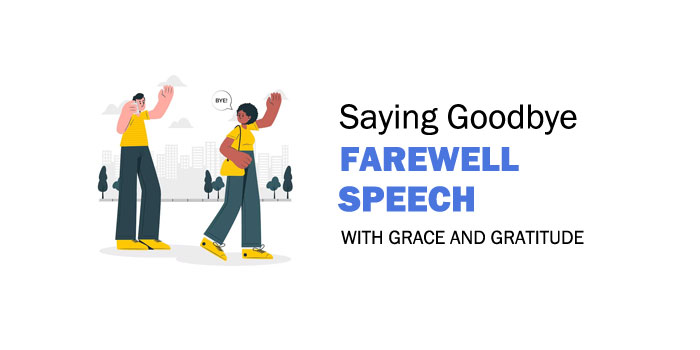
As much as we’d like our goodbyes — whether to a job, a loved one, or a chapter in our lives — to be extended and leave us with a lasting feeling of warmth and appreciation, that isn’t always the case.
A well-crafted farewell speech has the potential to turn any difficult goodbye into a fond farewell, leaving all parties feeling gracious and grateful. To guide you in bringing your goodbye to its highest form, let’s delve into the art of delivering a good farewell speech.
What is a Farewell Speech?
A farewell speech is a way to mark one’s departure from an organization, group, or event. It’s typically delivered by someone who is leaving or has recently left their role or position in the organization and is typically intended to say thank you and express empathy and gratitude for the audience.
Farewell speeches often include a call to action for those who remain in the group or organization, providing insights and advice that can help the group move forward even after the speaker leaves.
The debate about what constitutes an effective farewell speech depends largely on the context of the particular situation.
On one hand, some people argue that a simple goodbye and thank you are all that is needed in order to properly bid farewell. They might argue that more than this would be repetitive and unhelpful as it would not add any new information or create any additional value.
On the other hand, others argue that a more detailed goodbye and send-off provides more closure, comfort, and support, allowing those remaining to better process the change and find growth opportunities in it.
No matter the approach taken, however, it’s important to recognize that farewell speeches are important moments for both those who are leaving and those who are staying; they provide an opportunity for reflection on memories shared, lessons learned, and relationships formed—all of which contribute to making an impactful farewell experience.
With this in mind, the next section will discuss what makes an effective farewell speech.
Quick Answer
A farewell speech is an important way to mark one’s departure from an organization, group, or event. It usually includes gratitude and a call to action for those who remain in the group. Farewell speeches often include a reflection on memories shared, lessons learned, and relationships formed. What constitutes an effective farewell speech depends on the situation but it should provide closure and comfort.
What Makes an Effective Farewell Speech?
The delivery and content of a farewell speech can significantly influence the sentiment behind goodbye messages. It’s important for sendoff speakers to emphasize gratitude and to express their appreciation for the time spent with colleagues, friends, or family.
A successful farewell speech should be heartfelt, sincere, and thoughtful. When crafting a farewell speech, speakers may want to consider incorporating elements like humour, humility, and inspiration in order to add depth to their words.
Additionally, touch upon shared emotions to convey the bond between both parties. Focusing on these three elements allows for a memorable sendoff that will stick with the crowd in attendance.
Humour is an effective way of connecting with the audience and lightening the atmosphere; providing some levity amongst more serious anecdotes. Self-deprecating remarks can be a way of connecting with colleagues in a more intimate way; showing you are equally as human as they are.
On the flip side, too much humour can sometimes come across as insincere and hinder the speaker’s attempt at conveying genuine emotion; arguably one of the key components of an effective farewell speech.
Moreover, include inspirational stories which feature distinct examples of gratitude within them—this will create greater authenticity and leave guests feeling impacted by your words.
As aforementioned, it’s vital for goodbyes to incorporate appreciation for time spent together—evoke specific memories and draw attention to individuals when necessary rather than speaking in generalities.
Ensure that your words make an impact on those who need to hear them. With these in mind, it’s possible to craft a successful transition from one stage of life to another through an effective farewell speech that is full of grace and gratitude.
Having addressed what makes an effective farewell speech, we’ll next discuss how best to show appreciation in sending off messages.
Showing Appreciation
Showing appreciation is a key element of any farewell speech. Expressing gratitude for the years spent in each other’s company conveys respect and admiration for all that has been accomplished.
When it comes to including words of acknowledgement and appreciation, many people choose to highlight the special moments shared, celebrate the successes seen, and offer thoughtful acknowledgements or simple thank yous.
However, there are opposing opinions on how to best show appreciation. Some suggest keeping dedications to a minimum so as not bore listeners with too much detail while others believe a more thorough approach can help create lasting memories and nostalgia.
The most important thing is to be mindful of your audience and what feels right based on the relationship that the farewell speech is celebrating.
If appropriate, consider having a moment at the end of your speech where you thank everyone individually while explicitly naming their individual contributions. A more public approach can include a round of applause directed at individuals who have had an impact on you along your journey.
In conclusion, expressing appreciation in a farewell speech provides an opportunity for reflection and celebration of meaningful experiences. Celebrating the occasion marks a special moment in time as one move forward in life or career.
Celebrating the Occasion
When someone is leaving their current role, it is important to take some time to celebrate and recognize their achievements. Celebrating the occasion acknowledges their contribution, gives thanks for their hard work, and shows gratitude for their time.
It can be a meaningful gesture that highlights the value of the departing employee or colleague, and can also be an inspiring opportunity for those who remain in the position.
In planning a celebration for the person’s departure, consider what would best suit their personality and interests. A simple going-away party, a framed thank-you card, or another creative form of recognition might be just the right way to say goodbye.
However, it is also important to consider how this celebration could affect morale and productivity within the team. If there is already tension in the workplace due to changes in leadership or a reorganization of roles, then holding a celebratory event could serve to further emphasize inequalities among employees or even create an uncomfortable environment.
When deciding how best to celebrate someone’s departure, it is important to assess both potential positive and negative implications of any action and plan accordingly. Doing so ensures that both the departing employee or colleague is properly recognized as well as all other members of the team feel respected and appreciated for their own contributions.
By acknowledging this balance appropriately, it will help ensure that everyone feels included and appreciated when saying goodbye. From here we can move on to discuss how to use a farewell speech to inspire your audience.
Inspiring Your Audience
In order to move an audience and leave a lasting impression, it is important to ensure that your farewell speech is both inspirational and meaningful. To do this, consider talking about how much the experience meant to you, how much you have enjoyed and learned from your friends and colleagues, or highlighting the greatest accomplishments of the group.
Additionally, use personal anecdotes that reflect the experiences of everyone in the audience. This will not only inspire emotions in them but also allow them to connect with each other as they share similar memories.
If applicable, provide words of wisdom to encourage resilience and success in the future. Show gratitude for being part of something special, even if it may be difficult to say goodbye.
By doing so, you can instill hope rather than sadness in the audience with your kind words. By expressing solidarity and understanding, your message can picture a bright future on which everyone can look forward to despite leaving their respective positions.
Ultimately, it’s important to speak positively during a farewell speech so as to leave a good impression in people’s minds when departing. Inspiring your audience will also help them remember you fondly and feel positive about their time spent together.
As such, wrap up your speech with an example or phrase that gets repeated by people long after they heard it or send out a meaningful message that serves as an uplifting reminder for all who were present.
Now that we have discussed how to inspire an audience through a farewell speech it’s time to focus on what such speeches could be like. In the next section, we will cover examples of farewell speeches so you can get some great ideas on what to include in your own address.
Example of a Farewell Speech
When you’re leaving your current position at work, it’s customary to deliver a farewell speech. These speeches provide a meaningful way to say goodbye and reflect on the successes of your time spent in the role.
Here is an example of an effective farewell speech that can be tailored to your experience and the tenor of your workplace:
“Good morning everyone! I want to thank you all for being here today. As many of you know, today is my last day with [Company Name], and I wanted to take a few moments to say a few words about my experience here.
This company has been a great home for me during the last [insert length of time]. During my time here, I learned countless skills , met fantastic people, and made memories to last a lifetime. Working with all of you has been an incredible honor – you have always demonstrated kindness and strong work ethic. I’m sure the business will continue to grow under the capable leadership of [current leader].
I have enjoyed every minute of my time here and I wish this team tremendous success as they move forward. Remember: no matter what happens in life, don’t forget to find joy in what we do. Thank you so much for your support – now let’s celebrate!”
Farewell speeches are a great opportunity for reflection and sentimentality but it’s important to balance it out with humor or positivity depending on the setting.
On one hand, some people might opt for deeper reflections on their journey and how each person has played a part in their development, while others may choose to keep their speeches lighthearted and upbeat.
Regardless of which option works best for your audience, remember that these farewell speeches provide valuable opportunities to build connections before departing from an organization or team.
At the same time, it’s important not to let the farewell speech drag on too long – keep the message brief yet meaningful. This allows present colleagues to receive appreciation without disrupting daily workflow.
Prefer a longer example? Here’s one from George Washington to the people of the USA .
Crafting Your Own Farewell Speech follows similar guidelines – find the right mix between reflection and positivity in order to create an effective speech that resonates with its audience.
Crafting Your Own Farewell Speech
Crafting your own farewell speech is a task that should not be taken lightly. It requires thought and honest reflection to craft a meaningful and memorable goodbye speech.
Your words should pay tribute to the experience you have had while connecting emotionally with your audience. Crafting your own farewell speech gives you the opportunity to directly address how hard it was to leave and acknowledge the contributions made both by yourself and others in the organization.
When deciding on how to create a memorable farewell speech, there are two paths one can take. On one hand, those looking for guidance might want to find existing templates filled with the right sentiments that they can customize to fit their needs.
Alternatively, those who prefer writing from scratch can develop their own narrative thread, drawing on their own words of wisdom and emotions as they feel them in the moment.
When constructing a self-made speech, it’s important to remember brevity is key. Each word should have intent and purpose; it’s better to be thoughtful than wordy.
Bear in mind that this moment presents an opportunity for closure and for celebration for accomplishments along the journey you embarked upon together.
It’s also worth mentioning any lessons learned or valuable experiences gained during this transition. As daunting as this may sound, it can be immensely rewarding when done well.
Having taken into account both sides of creating a farewell speech, next is brainstorming potential topics that can serve as inspiration for crafting an effective goodbye message.
Brainstorm Topics
Brainstorming topics for a farewell speech allows you to come up with an effective way to express your gratitude and appreciation when saying goodbye. This is important because it helps you maintain dignity, respectfulness and meaningfulness in the words you choose to say.
Before delivering a heartfelt farewell, it’s important to consider what areas are worth mentioning.
You should focus on three main topics when creating a farewell speech: the past, the present, and the future.
When reflecting on “the past ,” you should focus on acknowledging your successes and accomplishments while working there. This helps to reinforce that your contributions did not go unnoticed and were appreciated by those around you.
It helps to inspire and motivate others with the knowledge of your success in the workplace. Consider thanking coworkers for helping you achieve your goals over time; collaborative efforts often go underappreciated and focusing on why their help was beneficial can be a pleasant surprise.
Another important topic to consider is “the present ”; this is where you can express your gratitude and thank everyone who has helped you through this long journey of leaving the company.
Provide sincere thanks to coworkers and colleagues who have been key in making it possible for you to depart gracefully.
Consider being transparent about what you have learned during your years in the organization and how these learnings will propel you forward into new opportunities or ventures.
Finally, mention how much the people in the organization mean to you, as well as how much they will be missed—this will help solidify that relationships were built during your stay at the company and that they won’t easily be forgotten or taken for granted.
Lastly, “the future ” focuses on optimism, hope, and reaffirms resilience—even in times of change. Here, emphasize any newfound strength that was built during this experience, as well as talk about future aspirations or goals with optimism.
Lastly, send off a few encouraging words for those left behind reminding them that great things can still occur despite difficulty or instability occurring at work due to your departure from the team.
With these three topics outlined it’s now time to choose your words carefully with precision so that the final speech resonates all of these concepts entirely; leading into a memorable goodbye for those who will hear it spoken aloud.
Choose Your Words Carefully
When crafting your farewell speech, it is important to choose your words carefully. Each word should invoke not only emotion, but also provide a level of understanding for the audience. It is essential that you communicate your message perfectly and with clarity.
To begin, strive to craft an introduction with strong language that grabs the attention of your listeners. This could range from using metaphors or analogies to compare yourself to a superhero or time traveler depending on the audience’s sense of humor and interests.
Anticipate potential questions from the audience and provide thoughtful answers in advance.
Be sure to include gratitude during your speech even if it’s uncomfortable. Doing so will make you look professional and acknowledge how much you appreciate any help given to you over the years. Showing appreciation will surely leave a lasting impression.
Try to close strong, offering perspectives to the colleagues who remain and looking ahead to new possibilities instead of focusing on sadness or regret. Reassure them that they too can pursue their dreams and opportunities just as you have, conveying optimism in the process.
Furthermore, reflect on your newfound clarity while providing an outlook full of positivity; emphasizing the benefits you may reap going forward regardless of any hardships faced along the way.
Choose your words carefully when preparing for a farewell speech; it will be key in making sure this moment shines.
Consider tips such as designing an introductio n full of strong language, expressing gratitude, and providing an optimistic outlook for those remaining when constructing your own dream goodbye speech.
As a final step before delivering it, practice speaking with emotion and deliver the speech body language that conveys both warmth and sincerity. With these strategies, you can say goodbye with grace and gratitude.
This next section looks at how best to deliver a farewell speech with emotion; from preparing beforehand to finding ways to connect with the audience on an emotional level while delivering it.
Deliver the Speech With Emotion
Delivering a farewell speech with emotion can make or break the impact of the speech. On one hand, some might say that showing too much emotion is not professional and may take away from the gravity of the situation.
For example, if someone gets overly emotional in a workplace setting, it could create an uncomfortable atmosphere. The speaker would need to maintain a certain level of composure to keep the focus of the audience and to remain professional.
On the other hand, delivering a farewell speech without emotion does not give justice to the heartfelt emotions connected to this particular occasion. Heartfelt tales of memories and personal experiences paired with earnest gratitude and respect should be expressed with intensity and feeling.
Audiences tend to connect more deeply with speeches that are delivered with genuine emotion rather than one filled with boring facts and statistics.
It is important to find balance in your delivery style between staying professional while also expressing your feelings fully in order to truly convey the gravity of the occasion.
A blend of stoic delivery and heartfelt emotions will ensure that everyone in attendance can both respect your professionalism while connecting on an emotional level with you as well.
As we have seen, it is important to strike a balance between staying professional while delivering a farewell speech with emotion – finding this balance will help ensure that everyone in attendance appreciates your sincere sentiments and respects your level of composure at the same time.
In the following section, we will discuss how to bid adieu in an effective conclusion to your farewell speech.
Conclusion: Saying Goodbye
Saying goodbye can be one of the most emotionally fraught experiences in a person’s life. It is a moment when all of the hard work, dedication, and fond memories come flooding back in a flood of mixed emotions.
Farewell speech examples can provide structure and guidance for those who are preparing their own speeches. There are many different types of farewell speeches, from those that are funny and lighthearted to those that are more reflective and sombre.
No matter which type of speech you decide to write or deliver, always remember to express your utmost gratitude towards the people who have helped you during your time with them. Aim to make your speech memorable by ending it on an emotional high note. Above all else, strive to keep it sincere and meaningful.
It is often said that endings can be bittersweet, however, with proper planning and preparation through reviewal of some farewell speech examples, your own farewell speech can be both graceful and positive.
When the words come from the heart they will often linger with your friends or colleagues long after they are gone. With this in mind, remember to make goodbyes count – not only for yourself but for the people around you as well.
Answers to Common Questions with Detailed Explanations
How should i structure my farewell speech.
Structuring your Farewell Speech is important as it can help to make sure that your thoughts and sentiments are expressed in an organized manner. There are several steps that you can take to ensure that your speech is well-structured: 1. Acknowledge the occasion and thank people for being there – After beginning with a warm welcome, state the reason for gathering and express gratitude to everyone present for attending the function. 2. Take time to share memories – Many farewell speeches are full of nostalgia so use this time to reminisce about moments from the past, stories from shared experiences, fond memories of work or successes achieved together. 3. Show Gratitude – Take some time to express appreciation for colleagues and associates for their support, friendship, and guidance throughout your tenure. Express any sorrow you may have in leaving. 4. Thank & Recognize those who Inspire You – Use this opportunity to thank anyone who has deeply inspired you or been influential in facilitating your success thus far. 5. Conclude with Encouraging Words – Retrospect on what was accomplished and speak positively about what lies ahead both for yourself and other colleagues.
What are some of the key elements of a successful farewell speech?
The key elements of a successful farewell speech are to leave your audience with appreciation and gratitude, reflect on your best memories, thank those who have impacted your journey, highlight accomplishments and share a few wise words or memorable quotes .
Start by thanking everyone in the room for attending and taking the time to celebrate with you. Make sure to express your appreciation and gratitude for the unique experience that this role brought you.
Reflect on some of the best moments you experienced while fulfilling this role, focusing on what you learned and how these experiences shaped and motivated you.
Next, thank those who influenced your journey, like mentors, colleagues and friends. Acknowledge their support and ask them to continue providing advice when needed.
Highlight your successes, as they demonstrate how much work was put into achieving these goals , which should be cause for celebration!
Lastly, offer a few nuggets of wisdom or quotes that resonated with you from this experience – not only will it make people think, but it can also leave a lasting impression.
By following these tips and sharing heartfelt words of appreciation and wisdom, you can create a memorable farewell speech that celebrates your accomplishments while looking towards the future.
What are some tips for delivering a memorable farewell speech?
Delivering a memorable farewell speech is no easy feat, but it can be done with a little practice , creativity, and confidence. Here are a few tips to help you make your speech stand out:
1. Know your audience – Keep in mind who will be listening to your speech and tailor it accordingly. Are they colleagues? Friends? Family? Making sure that your speech resonates with the people you’re addressing is key for delivering a compelling message.
2. Be personable – Letting some of your personality shine through in your speech is key for making it memorable. Personal anecdotes, humor, and quotes are all great ways to do this.
3. Focus on the present – Make sure that you address the present feelings of those in attendance instead of solely dwelling on the past or future. Remind everyone why their current relationship has been special and unique and emphasize what brought everyone together in the first place.
4. Avoid cliché phrases – Goodbye speeches often contain phrases like “it’s been a pleasure” or “I wish you all the best” but these can come across as insincere if overused. Instead, try to come up with thoughtful compliments or memorable expressions that reflect the spirit of your goodbye.
5. Leave on a high note – A memorable goodbye speech should end with a moment of gratitude and optimism; this will stay in everyone’s minds as you leave them for good. Express how glad you have been to work or connect with these specific people and express hope for successful futures for them all (including yourself).
- Condolences & What To Say
How to Write an Inspiring Farewell Speech: Step-By-Step
Updated 06/7/2022
Published 05/14/2020

Kate Wight, BA in English
Contributing writer

Cake values integrity and transparency. We follow a strict editorial process to provide you with the best content possible. We also may earn commission from purchases made through affiliate links. As an Amazon Associate, we earn from qualifying purchases. Learn more in our affiliate disclosure .
There are many times in our lives when we have to say goodbye to the people we care about. We may retire or switch jobs. We may move away or graduate. We may even die. If you’re leaving a place or situation, you may be asked to give a farewell speech.
Jump ahead to these sections:
Step 1: determine your audience, step 2: figure out what you want to say, step 3: make an outline, step 4: be personal, step 5: don’t speak for too long, step 6: practice makes perfect, sample farewell speeches.
This can be nerve-wracking for people who aren’t experienced in writing speeches or speaking in public. You may be tempted to just read a farewell poem and call it a day. But even a novice writer can craft an inspiring farewell speech.
Here, we’ll break down how to write one step-by-step and also provide examples of farewell speeches from several different occasions.
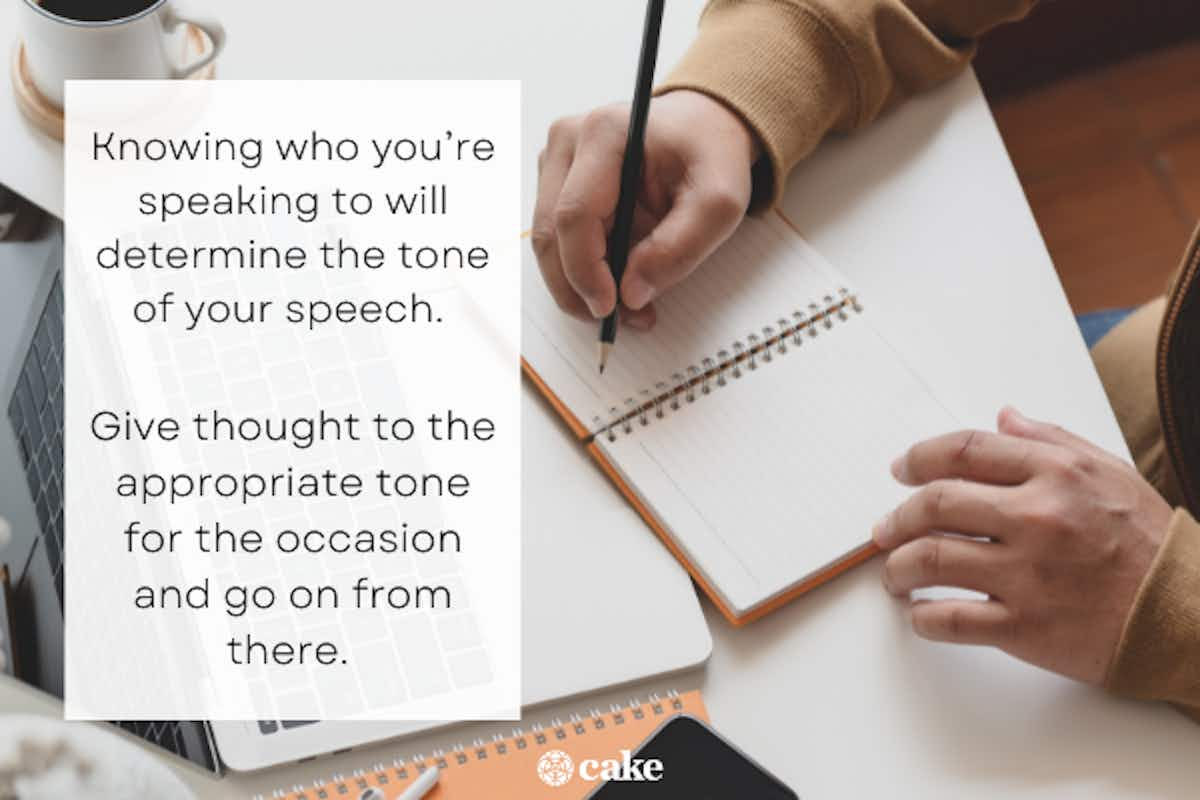
Knowing who you’re speaking to will determine the tone of your speech. If you’re giving a retirement speech or saying goodbye to a co-worker, you’ll want to be slightly more formal. It’s definitely not the right place to engage in risqué humor.
If you’re a valedictorian speaking to your classmates, strive for an uplifting and inspirational tone. If you’re eulogizing yourself at a living funeral, you can be more irreverent than you might be eulogizing someone else. Give thought to the appropriate tone for the occasion and go on from there.
Even professional writers and public speakers can’t just whip up a speech in one draft. Before you start writing, take some time to jot down some ideas.
Are there particular stories you want to share about your time with the people you’re speaking to? Make a note of them. Are there specific anecdotes about coworkers or friends you want to revisit? Write those down, too. Once you’ve narrowed down what you want to say, you’ll find it a lot easier to begin writing.
Once you’ve figured out what you want to say, it’s time to write up an outline. A speech should include the following components:
- Introduction: This will set the tone for the rest of your speech. A good introduction will grab people’s attention and keep it on you. A good introduction will include a greeting to the audience. It may also contain an icebreaker like a joke to loosen up the crowd. Finally, it will let people know the purpose of the speech.
- Body: This is the meat of your speech. In the body, you can delve into the stories and anecdotes you wrote down in your brainstorming session. You will likely be talking about a few different events, so make sure to include transitions between events.
- Conclusion: Finally, you’ll need to wrap up your speech. Most conclusions will summarize things you’ve already covered. For a farewell speech, you may want to end on a poignant note, even if the rest of your speech has been fairly lighthearted. This lends it emotional resonance.
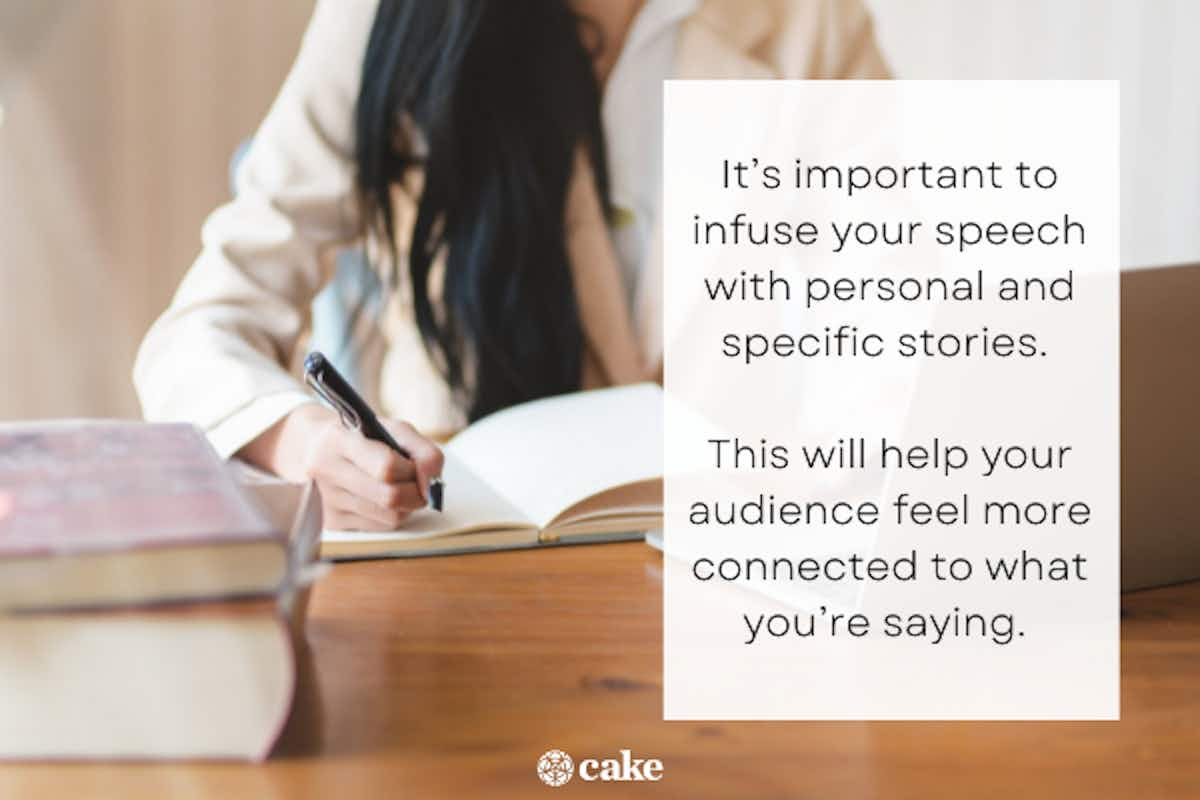
You may want to make your speech feel perfect and polished. The problem with that is that a perfectly polished speech can end up feeling a little generic.
It’s important to infuse your speech with personal and specific stories. This will help your audience feel more connected to what you’re saying.
Once you’ve completed your speech, it’s time to edit it down. People may start to tune you out if you go on for too long. Even if your introduction is attention-grabbing, it won’t keep people engaged indefinitely. Five minutes is an appropriate length for more casual speeches. For a more formal farewell speech, you could speak for up to ten minutes. This might apply to a valedictorian speech at graduation or a retirement dinner for an important company figure.
Ultimately, you need to use your best judgment. Read your speech out loud, being sure to speak slowly and clearly enough to be understood. Factor in pauses for laughter during humorous moments. If your speech is too long, then go through and trim out any unnecessary parts. This will ensure your speech is as strong and memorable as possible.
You may think that once your speech is written, you’re all done. But there’s still one more important step. You need to be comfortable delivering your speech. This means practicing it as many times as it takes.
A lot of people will rush through speeches if they feel nervous or uncomfortable in front of a crowd. Practicing it at the correct speed will help ensure you don’t speak too fast on the actual day of a farewell event. It’s almost like muscle memory. As you practice, you can even note spots where you need to breathe or take a sip of water. Being prepared for little things like that can make you feel more confident.
Practicing can also help you memorize your speech. However, this doesn’t mean that you need to go up without cards or notes. Even the most well-prepared person can have a forgetful moment. Without notes, you may panic and go completely blank.
Keep your speech in front of you so you’re able to quickly pick up where you left off. Just don’t rely on your notes too heavily, either. You want to connect with the audience by making eye contact. Practicing and preparing can help you strike the right balance.
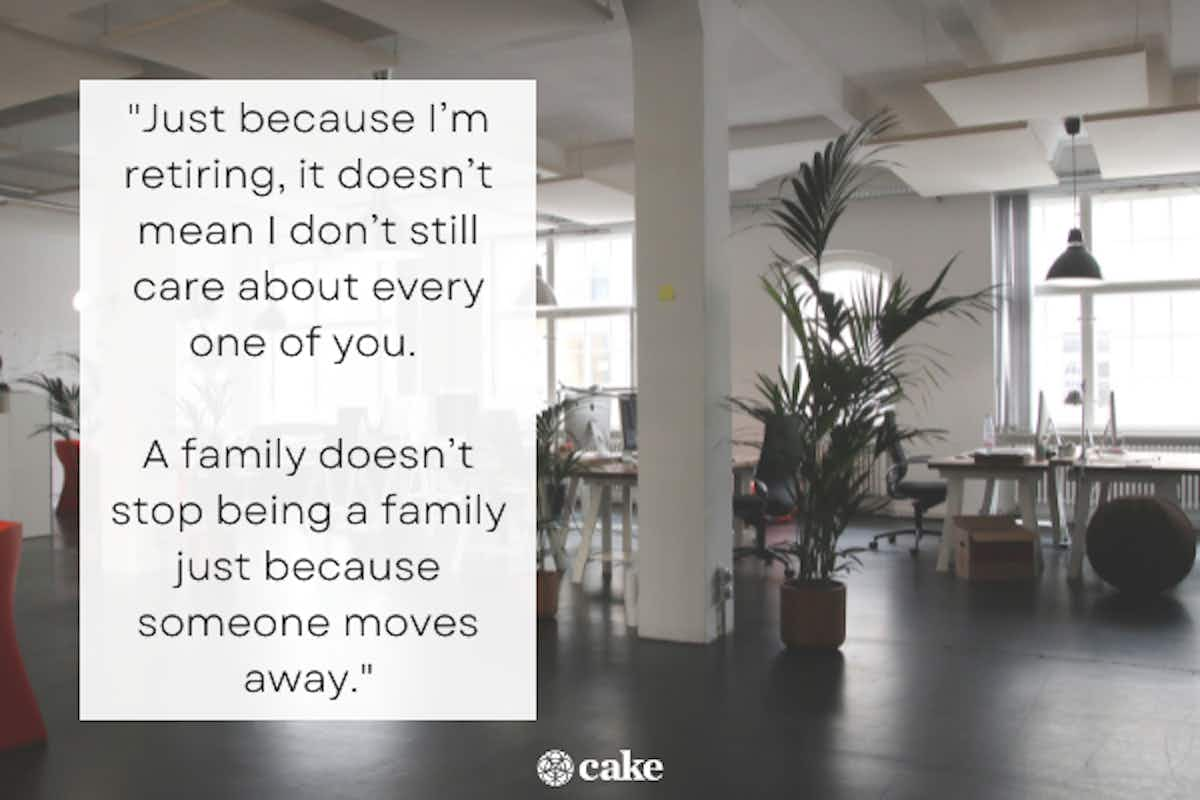
Now that we’ve broken down the steps that go into writing a farewell speech, we’ll share some examples. You can see how to say goodbye to coworkers through a touching retirement speech. You can see how people say goodbye when graduating or moving away.
You can even see how someone eulogizes themselves at a living funeral . Read on for excerpts from all of these kinds of farewell speeches:
Example for saying goodbye at work or retirement
“Over the past twenty years, I’ve seen this company grow from five people to over five hundred. But even though the office has changed significantly over the years, some things remain the same. We are truly like a family here. We’re just a much larger family than we used to be.
But just because I’m retiring, it doesn’t mean I don’t still care about every one of you. A family doesn’t stop being a family just because someone moves away. Anytime you need to talk, I’m just a phone call away.”
Example for saying farewell at the end of someone’s life
“I’ve attended an unfortunately large number of funerals in the past several years. This is the first time I’ve ever attended my own, though.
I decided to have a living funeral after burying so many of my other friends who also had terminal illnesses. I thought it was a real shame that they didn’t get to hear their friends and family members celebrate them. Perhaps selfishly, I want to hear all of you talk about how awesome I am.
But more than that, I wanted to take this opportunity to celebrate you, too. If you’re here, it’s because I can never fully express how much your support has meant to me while I’ve battled this illness. You’ve all helped me in so many ways. You’ve driven me to treatments. You’ve organized meal trains to feed my family. You’ve cleaned my house. You’ve taken care of my kids. You’ve told me jokes and let me vent. You’ve laughed with me and cried with me. You’ve been there for me in so many ways.
As you all know, we’ve hit a point where treatment isn’t doing anything to help anymore. I’ve gone ahead and discontinued it because it’s making me feel terrible and not actually doing anything. I’d rather go out peacefully and say goodbye on my own terms. And what better way to do that than throw myself a funeral party? So everyone please enjoy some food and music. And don’t forget to come over and tell me how great I am, because I do want to hear it.”
Example for students or teachers
“Over the past four years, our class has been through a lot together. We’ve had ups and downs, but no matter what, we’ve always come through it closer than ever. Maybe it’s because we’re such a small school. While we might not all be the closest of friends, we don’t have the same cliques you might find at other schools. That might also be because many of us have been in school together since kindergarten. In a lot of ways, we’ve always been like a team.
Now that we’re all going off to college, many of us will be on our own for the first time. It’s bound to be an enormous challenge for some. But I have faith in every single one of us. We’re graduating from a highly-competitive college prep school. Everything we’ve been through has prepared us for this.
We may be small fish going into a big pond. But we’re some of the smartest and toughest small fish you’re going to find. And ultimately, even if we end up scattered across the country, I know I’ll always be able to count on you. And I hope you know you can always reach out to me, too.”
Example for someone who’s moving away
“Moving away from friends isn’t exactly new for me. With a wife in the military, I end up having to pack up every few years to move. I know you all know what that experience is like. But this is definitely the hardest time I’ve ever had packing up to go.
Y ou don’t always encounter a lot of other civilian husbands living on base. It’s been incredible having a built-in support system with other dads and husbands who understand what this life is like. I’m really going to miss having our families all get together for cookouts on the weekends.”
Writing an Inspiring and Memorable Farewell Speech: Tips, Tricks, and Examples
When you’re leaving people behind, it’s hard to know how to say goodbye . You may worry that you won’t be able to properly express what the people in your life have meant to you.
Just follow the steps above and remember to speak from your heart. At the end of the day, that’s what will have the most impact.
And if you're interested in unique ways to continue someone's legacy after their passing, you can consider a custom urn from a store like Foreverence or even have a memorial diamond made from ashes with a company like Eterneva .
Categories:
- Legacy Projects
You may also like

How to Write a Meaningful Appreciation Speech

How to Write a Funeral Speech for Dad From a Daughter

How to Write a Father’s Day 2022 Speech: Step-By-Step
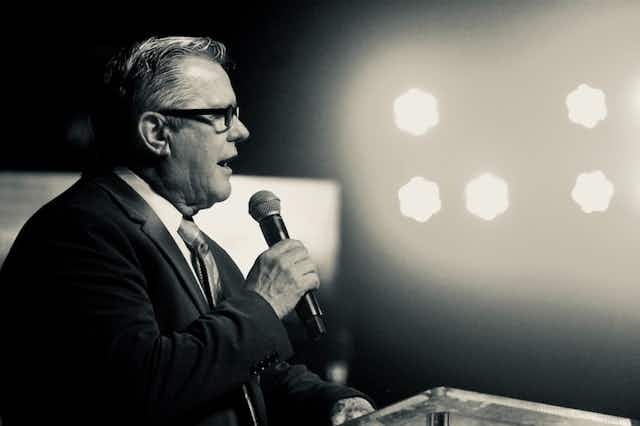
How to Write a Memorable Tribute Speech: Step-By-Step
Speech Writing
Farewell Speech
Farewell Speech - Writing Tips & Examples

People also read
The 10 Key Steps for Perfect Speech Writing
Understanding the Speech Format - Detailed Guide & Examples
How to Start A Speech - 13 Interesting Ideas & Examples
20+ Outstanding Speech Examples for Your Help
Common Types of Speeches that Every Speechwriter Should Know
Good Impromptu Speech Topics for Students
Entertaining Speech Topics for Your Next Debate
How to Write a Special Occasion Speech: Types, Tips, and Examples
Introduction Speech - A Step-by-Step Guide & Examples
How to Write the Best Acceptance Speech for Your Audience?
Presentation Speech - An Ultimate Writing Guide
Commemorative Speech - Writing Guide, Outline & Examples
How to Write an Extemporaneous Speech? A Step-by-Step Guide
Crafting the Perfect Graduation Speech: A Guide with Examples
Farewell speeches can be tricky to write. You might worry about saying the right things and making a good impression.
Don't worry; we're here to help.
In this blog, we'll show you how to create a touching farewell speech step by step. Whether you're new to this or have some experience, we've got you covered. You'll learn how to speak from the heart and leave a lasting memory with your audience.
- 1. Occasions for Giving a Farewell Speech
- 2. How to Start a Farewell Speech?
- 3. How to Write a Farewell Speech?
- 4. Farewell Speech At Work
- 5. Farewell Speech Examples
- 6. Writing Tips for a Farewell Speech
Occasions for Giving a Farewell Speech
Farewell speeches are a type of speech that are delivered when someone is parting from a group, organization, or event.
They can be for retirement, leaving a job, or stepping down from a leadership role. Students often give farewell speeches during high school or college graduations.
These speeches mark the end of an important chapter in their lives. Students may also give farewell speeches when leaving clubs, sports teams, or student councils.
These speeches allow people to express gratitude, share memories, and inspire their peers.
So, it's important to carefully keep in mind the context for the farewell speech before you start writing one.
How to Start a Farewell Speech?
If you want to leave an impression on the audience, the key is to write a brilliant speech. A good speech can not be written without a plan. No matter if you are writing a casual speech or a very formal address, planning is essential.
Before you jump to the writing process of a farewell speech, learn how to make a start. Only good planning will let you execute the ideas successfully and effectively.
To make a start, follow the steps given below:
Step 1 - Identify the Audience
Think about your audience. Who will be listening to your speech? Is it colleagues, friends, fellow classmates, family, or a mix of these?
Consider what they might expect from your speech and what kind of tone and message would resonate with them. Your speech should be relatable to your audience.
Step 2 - Brainstorm Relevant Ideas
Now that you know your audience, make a list of the key points you want to include in your speech.
These could be memories, achievements, lessons learned, or well-wishes. Brainstorming these ideas will give you a clear direction for your speech.
Step 3 - Gather Stories and Anecdotes
Collect stories and anecdotes that relate to your key points. Shared stories and experiences can add a personal touch to your speech and make it more engaging.
These stories should support your main message and create a connection with your audience.
Step 4 - Create an Outline
Although farewell speeches are informal and more personal, they still require a particular outline.
So, before you dive into writing, create a rough outline for your speech.
This can be a simple bullet point list of the main sections of your speech, including the opening, body, and conclusion. Outlining helps you organize your thoughts and create a format for your speech.
How to Write a Farewell Speech?
If the planning of your goodbye speech is intense and structured, the execution of the ideas will become easier. Once all the prewriting steps are taken effectively, follow the writing steps provided below:
Step 1 - Create an Interesting Opening
When you write a farewell address, you have the opportunity to be creative and personal. Begin with an attention-grabbing opening to captivate your audience.
Dull beginnings can lose your audience's interest quickly. You can kickstart your speech with humor, a casual statement, a meaningful quote, or a relatable anecdote.
After the hook, share your feelings about leaving the place or position. Greet your audience and briefly state the purpose of the event.
Struggling to come up with a good way to start your speech? Check out these creative ways to start a speech and grab your audience’s attention!
Step 2 - Create a Strong Body
The body of your speech contains the heart of your message. Here, you'll share ideas, stories, events, and key points. Be sure to provide relevant information. While crafting the body of your speech:
- Be Personal: Make your farewell speech relatable by using personal anecdotes and a conversational tone. Engage your audience with your words and emotions.
- Keep It Concise: Lengthy speeches can lose their impact. Keep it concise and straightforward. Focus on events and moments involving others, avoiding excessive self-focus. Steer clear of repeating or over-explaining.
Step 3 - Provide Closure
Conclude your farewell speech by summarizing the main points and expressing gratitude. You can also extend well wishes or share a relevant quote. This closing part wraps up your speech on a thoughtful note.
Step 4 - Review and Practice
Before delivering your speech, review it thoroughly. Read your speech aloud to check the tone and flow. Practice your delivery to ensure it comes across as genuine and not overly scripted.
Farewell speeches are given in various settings and to diverse audiences.
Farewell Speech At Work
Saying goodbye at work, be it in a retirement speech or when leaving colleagues, marks a significant moment in your career. Let's look at two common work occasions for giving a farewell speech:
Farewell Speech for Boss
This speech is given when your manager is leaving the company or moving to a new position. It includes an introduction, appreciation for their leadership, personal anecdotes, well wishes, and a warm farewell.
Here’s a sample speech for biding your boss goodbye:
Farewell Speech For Boss
Farewell Speech for Colleagues
Farewell speeches for colleagues are given when a team member is leaving the organization, transferring to a different department, or relocating.
Here’s an example of how you can create a speech for your co-worker:
Farewell Speech For Colleague
Farewell Speech Examples
As discussed, farewell speeches are given on many occasions. Some of the most popular farewell speeches have to be American presidential speeches. These speeches reflect on the tenure, express gratitude to the nation, and offer guidance for the future.
Here is a segment from Harry Truman’s presidential farewell speech , 1953:
Here are some farewell speech examples for students and teachers:
Farewell Speech For Teachers
Are you a teacher by profession who is leaving the job or position from a certain school? Then you might be asked to deliver a farewell speech. The example provided below will help you write an impactful speech.
Sample Farewell Speech for Teachers
Farewell Speech for Students
Students often find writing farewell speeches daunting. Whether it is a graduation speech or just a goodbye speech in a classroom, students have no idea what to say.
If you need to give a farewell address at school, here are some samples:
Sample Farewell Speech for Students
Farewell Speech by Students Leaving School
Farewell Speech in English
Farewell Speech for Seniors
Need more sample speeches? Explore these speech examples of multiple types of speeches to get inspiration!
Farewell Speech for Friends
Saying goodbye to friends or family members is the hardest but delivering a speech to them is the easiest.
As it is an informal type of speech, people can start from anywhere and say anything. But if you are not sure how to say goodbye to friends, take help from the example below.
Sample Farewell Speech for Friends
Writing Tips for a Farewell Speech
While there are no strict rules for speechwriting, some tips can make your address memorable.
- Share Personal Experiences - Share your stories and incidents to make your goodbye address memorable. Through your personal experiences, state how things and actions of others influenced you and your life
- Show Gratitude - Showing gratitude is the right attitude. Thank people and their gestures with an open heart.
- Keep it Short - Avoid dragging your speech and share interesting information only.
- Use Simple Words - Avoid using bombastic vocabulary. You are not there to impress anyone but just to be grateful for the efforts.
- Be Original - Copying the addresses of others is not the right choice. Be unique and original and write your content for the speech.
Now that you've gained insights into crafting a meaningful farewell speech, you can create a memorable and heartfelt address.
However, if you're feeling lost and need assistance in crafting a farewell speech, let our legit essay writing service help. Our team of experts boasts years of experience in delivering high-quality speeches.
Just buy speech from our writers and they will undoubtedly exceed your expectations!

Write Essay Within 60 Seconds!

Dr. Barbara is a highly experienced writer and author who holds a Ph.D. degree in public health from an Ivy League school. She has worked in the medical field for many years, conducting extensive research on various health topics. Her writing has been featured in several top-tier publications.

Paper Due? Why Suffer? That’s our Job!
Keep reading

My Speech Class
Public Speaking Tips & Speech Topics
How to Write a Farewell Speech – Tips & Samples

Amanda Green was born in a small town in the west of Scotland, where everyone knows everyone. I joined the Toastmasters 15 years ago, and I served in nearly every office in the club since then. I love helping others gain confidence and skills they can apply in every day life.
A farewell speech is one of the best ways to send off a departing co-worker, friend, or family member. It allows you to express gratitude for their contributions and wish them well in their new endeavors.
Additionally, a farewell speech can be a great opportunity to reflect on shared memories and offer wisdom for the future. Let’s see what the best farewell speech looks like based on different situations. I’ll explain everything plus include sample farewell speeches.
Farewell or Goodbye Speeches

As you move on to the next phase in your life, it is important to take a second to reflect on special memories and all you’ve accomplished. A farewell speech is a perfect opportunity to do just that.
Whether you are retiring, resigning, or moving to a new company, a farewell speech is a chance to look back on your time at your current job and express your gratitude for the experiences you have had. It is also an opportunity to say goodbye to your colleagues and wish them all the best in their future.
What Is a Farewell Speech?
A farewell speech is a type of speech that is typically given at the end of a person’s tenure in a particular role. It’s often a professional goodbye but with a relaxed tone given at a farewell party or event.
For example, a student might give a farewell speech upon graduating from college, or an employee might give a farewell speech upon retiring from a company. Sometimes, a person might also give a farewell speech when leaving a particular organization or position, even if they aren’t retiring.
A prepared farewell speech usually contains personal memories, thank yous, feelings about the people involved, and a simple goodbye in person.
Can We Write Your Speech?
Get your audience blown away with help from a professional speechwriter. Free proofreading and copy-editing included.
Farewell speeches are typically intended to be positive and uplifting and to thank those who have helped the speaker during their time in the role. They may also include words of wisdom or advice for those who remain.
What Should I Say in a Farewell Speech?
When leaving an organization or group, it is customary to give a farewell speech. This speech is a chance to thank the people who have helped you during your time with the organization and to wish them well in the future.
You may also want to share some advice or words of wisdom with the group. When preparing your speech, consider what you would like to say and what message you would like to leave with the group.
It’s also important to be mindful of the tone of your speech. A farewell speech should be positive and uplifting, so avoid dwelling on negative experiences or speaking ill of the organization or group.
Take the time to write your thoughts and practice delivering your speech before the big day. With a little preparation, you can deliver a farewell speech that is both memorable and meaningful.
How Do I Start a Farewell Speech?
When giving a farewell speech, it is common to start by thanking the audience for attending. This helps to set a polite and appreciative tone for the rest of the speech.
It is also common to give a brief overview of the event or occasion that is being farewelled. For example, you might talk about how much fun the party was or how successful the project was.
This helps to create a sense of shared experience and nostalgia. Finally, it is common to finish with a positive message or thought. This could be something as simple as wishing everyone all the best for the future.
By starting with thanking the audience, you can ensure that your farewell speech is polite and engaging.
What Do You Say in a Goodbye Speech for a Colleague?
Finding the right words to say when saying goodbye to a colleague can be difficult. After all, you want to express your appreciation for their contributions while also acknowledging the sadness of their departure. Here are some of my suggestions for what to say in a goodbye speech to a colleague.
What They Contributed
First, take a moment to reflect on the positive impact that your colleague has had on your life and career. What have they taught you? How have they made you a better person? Be sure to express your gratitude for their guidance and mentorship.
Best Wishes
Next, wish them all the best in their future endeavors. Whether they are moving on to another job or retiring, let them know that you believe in their ability to achieve great things.
Finally, offer your support if they ever need anything. Let them know that you’re always there for them, whether it’s a reference for a new job or just someone to talk to.
Saying goodbye to a colleague can be tough, but expressing your appreciation and support can make it a bit easier for both of you.
What Do You Say in a Short Leaving Speech?
It is often said that brevity is the soul of wit. This is certainly true when it comes to giving a leaving speech. Whether you are stepping down from a club presidency or saying farewell to your colleagues at a retirement party,
it is important to keep your remarks brief and to the point. A few key elements should be included in any leaving speech.
First, take a moment to express your gratitude for the opportunity that you have been given. Next, focus on the future and discuss exciting new opportunities. Finally, leave your audience with a positive message, and encourage them to continue working hard in the months and years to come.
How Do You Thank in a Farewell Speech?
One of the most important elements of a farewell speech is thanking the people who have helped you along the way. Whether you are leaving a job, a team, or an institution, it is important to take a moment to express your gratitude.
Thank those who have been directly involved in your journey. This may include mentors, colleagues, or supervisors.
Next, thank the larger community that has supported you. This could include friends, family, or simply those who have taken an interest in your work.
Don’t forget to thank yourself! After all, it is your hard work and dedication that have brought you to this point.
Tips for Delivering a Memorable Farewell Speech at Work

I’ve written a number of speeches in my life, and these are some of my tips on how to do it right.
Draft an Outline
I’m insistent about outlines in every aspect of my life, from the next book I’m writing to an article and, yes, speeches. When preparing to give a farewell speech, one of the most important things you can do is create an outline. This will help you to organize your thoughts and ensure that your speech flows smoothly.
A good outline will also help you to keep your speech within a reasonable length. If you need help figuring out where to start, there are a few key points you should always include in your farewell speech.
First, thank the audience for their time and attention. Next, introduce yourself and explain why you’re giving the speech. Then, give an overview of the main points you’ll be covering. Finally, conclude with a call to action or a personal message.
Include Relevant Details
Giving a farewell speech can be difficult. You want to say goodbye to your friends and colleagues in a memorable and appropriate way. One of the best ways to do this is to include relevant details in your speech.
For example, you might tell a story about a time when you worked together on a project or helped each other out. This will help to personalize your speech and make it more relatable for your audience.
Including specific details also helps to show that you have been paying attention to the people you are saying goodbye to. It shows that you value their friendship and want to remember the good times you have shared.
Expand on Your Ideas With the Right Tone
Any good speech, whether for a graduation, a retirement, or any other occasion, should have a clear, concise, and cohesive message. It should also be engaging, drawing in the audience and leaving them with a lasting impression.
However, choosing the right tone is one of the most important aspects of giving a speech. The tone of your voice can convey confidence, authority, and sincerity, or it can come across as nervous and uncertain.
If you want to give a farewell speech that will be remembered fondly, it is essential to choose the right tone. A confident and sincere tone will let your audience know that you are sincere in your words and that you believe in what you are saying.
Conversely, a nervous or uncertain tone will make your audience question your message and may leave them feeling uninspired.
Add Humor When Appropriate
As anyone who has ever given a speech knows, it is often difficult to find the right words to say. This is especially true when giving a farewell speech, as you want to strike the right balance between appreciation and levity.
One way to do this is by adding humor when appropriate. A well-placed joke can help to lighten the mood and show your audience that you are comfortable with the situation.
Also, humor can help break the ice, especially if you speak to a group of people who do not know each other well.
Just be sure to keep your jokes tasteful and appropriate for the occasion. With a little humor, you can give a farewell speech that will be remembered for all the right reasons.
Edit Your Speech
When giving a farewell speech, it is important to ensure that your words are well-chosen and carefully edited. This is not a time for spontaneous ramblings or off-the-cuff remarks.
Your farewell speech should be memorable, which means taking the time to edit your words to be powerful and impactful.
There are a few benefits to editing your speech. First, it will help you to choose the right words. You want your words to be meaningful and to capture the essence of what you are trying to say.
Second, editing will help you clarify your thoughts and communicate your message. And finally, editing will help ensure that your speech is free of any grammatical errors.
Ask for a Trusted Colleague’s Opinion
For several reasons, asking for a trusted colleague’s opinion before giving a farewell speech to colleagues can be beneficial. First, it can help to ensure that the speech is memorable and appropriate for the occasion.
It ensures that the speech is well-received by the audience. You can test to see if you’re comfortable with your speech and check that the speech is tailored to the individual’s needs.
Finally, it can help to ensure that the speaker has the opportunity to practice before delivering the speech. Overall, asking for a trusted colleague’s opinion can be a helpful way to prepare for a professional speech of farewell.
Farewell Speech Examples
Use these prompts to create original speeches for your farewell or goodbye. They can be tweaked for funeral speeches, formal farewell speeches, or any other personalized speeches you need.
Example of Farewell Resignation Speech
“Thank you all for being here today. I’m honored to be given the opportunity to say a few words on behalf of everyone.
First, I want to say how much I’ve enjoyed working with everyone over the past year. It’s been a pleasure getting to know you all, and I truly appreciate your support.
As many of you know, I’ve been offered an exciting new opportunity that I’ll be starting next month. While I’m excited about this new chapter in my life, I’m also sad to leave such a great team behind. I assure you that I’ll be available to help with the transition in any way possible.
And, of course, I’ll stay in touch. Thank you all again for everything. I wish you all the best in the future.”
Example of Farewell Speech at Graduation
“As we stand on the threshold of a new phase in our lives, it is natural to feel both excited and apprehensive about what lies ahead. But no matter what the future holds, we will always remember our time together. This school has been our second home, and we will always treasure the fond memories we have made.
As we go our separate ways, let us never forget the lessons we have learned. Let us use them to make the world a better place for all. And let us stay in touch, so we can continue supporting and encouraging each other as we pursue our dreams.
Thank you all for everything. Good luck and best wishes for your future endeavors!”
Example of Farewell Retirement Speeches
“It is with mixed emotions that I stand before you today to deliver my farewell speech. On the one hand, I am sad to be leaving a job I have loved for many years. But on the other hand, I am excited to begin this next chapter in my life.
Retirement allows me to finally pursue some of my long-held dreams and goals. And although I will miss everyone here at the office, I take comfort in knowing we will all remain in touch. I want to thank each and every one of you for your support over the years. It has been truly appreciated.
And although I am looking forward to this next phase of my life, I will always cherish the memories we shared. Thank you.”
Example of Farewell Speech for Colleague Retirement
“On behalf of everyone here at ABC Company, I would like to say a few words to celebrate John Doe’s retirement.
John has been with us for over thirty years, and in that time, he has made an indelible mark on our organization. He has been a mentor to many of us, and his expert advice will be sorely missed.
We are all better for having known John, and we wish him all the best in his retirement. Thank you, John, for everything.”
The Bottom Line
A farewell speech is an important opportunity to express gratitude, offer words of wisdom and a note of memories, and say goodbye to those who have been important in your life. They can hold a humorous tone or lean more towards a simple and respectful tone.
Farewell speeches can also be a chance to say goodbye to a person or group you may never see again. As such, they offer an opportunity to express sentiments that might otherwise go unsaid.
4 Best Tips on How to Memorize a Speech Quickly
How to Write a Retirement Speech – Samples & Ideas
Leave a Comment
I accept the Privacy Policy
Reach out to us for sponsorship opportunities
Vivamus integer non suscipit taciti mus etiam at primis tempor sagittis euismod libero facilisi.
© 2024 My Speech Class

Farewell Speech: Words Marking LIfe’s Transitions

When leaving a job, position, or place, it is common to give a farewell speech if there is a get-together in your honor. You might graciously thank your colleagues, friends, and neighbors for the good times you enjoyed together, share some stories, and express your regrets upon leaving.
As the time to bid adieu draws near, the bittersweet emotions of a farewell speech come into play. Farewell addresses mark significant milestones , be it in schools, workplaces, or any other sphere of life. They serve as an opportunity to look back on cherished memories, express gratitude, and inspire others for the journey ahead.
This article delves into the essence of a farewell speech, exploring the power of nostalgia, the importance of heartfelt words, and the potential to ignite hope as we embrace new chapters in our lives.
Table of Contents
What Are Some Occasions Where You May Be Called Upon To Give A Farewell Speech?
Several occasions may call upon a farewell speech. Here are a few common situations:
- When someone is retiring from their profession after a long and successful career, a farewell speech is often given to honor their contributions, express appreciation, and wish them well in their future endeavors.
- At the end of an academic journey , whether it’s high school, college, or any other educational institution, students may deliver a farewell speech to reflect on their experiences, thank their teachers and peers, and share aspirations for the future.
- When leaving a job or embarking on a new career path , a farewell speech can be an opportunity to express gratitude to colleagues, mentors, and superiors, share reflections on professional growth, and bid farewell to the work community.
- Moving away from a community or a place where you have established connections can warrant a farewell speech. It allows you to express appreciation for friendships, memories, and the community’s impact on your life.
- Farewell speeches can also be given during farewell parties or gatherings organized to bid farewell to a friend, colleague, or loved one who is leaving for an extended period or permanently. It provides an opportunity to celebrate the person’s presence in our lives and convey your best wishes for their future.
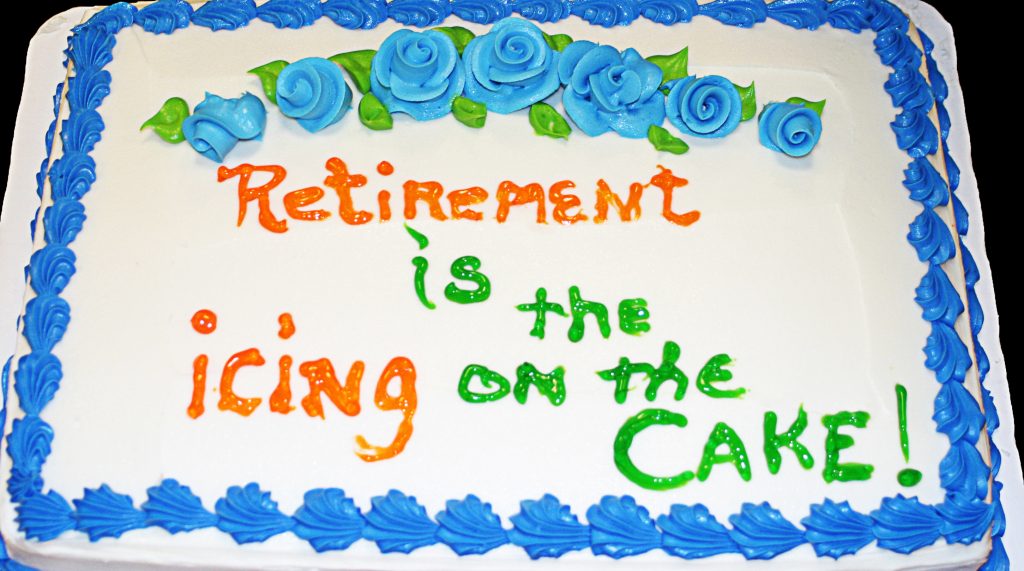
Sentiments You Might Express When:
Leaving a job.
Thank the organization for the employment opportunity, support, and professional growth provided during your tenure. Acknowledge the hard work, contributions, and camaraderie of your colleagues, expressing appreciation for their collaboration and support.
Discuss positive things like significant achievements or projects completed, showcasing the impact and value you brought to the organization. Extend your best wishes to the organization, your colleagues, and the team for their future success, and express excitement for your own future endeavors.

Transferring To Another Office
Share how the experience in the current office has contributed to your personal and professional development , highlighting the skills and knowledge gained.
Express excitement about the upcoming transfer , emphasizing the new challenges, perspectives, and opportunities that lie ahead in the new work environment. Express your eagerness to work with the new team, learn from their expertise, and contribute to their success while expressing gratitude for the relationships built in the current office.
Thank the neighbors, friends, and members of the community for their support, friendship, and the memories created during your time in the area.
Reflect on specific memories or experiences that hold a special place in your heart, highlighting their positive impact on your life.
Talk about your anticipation for the new home and location , emphasizing the opportunities for personal growth, new experiences, and building new connections.
Assure your current community that you value the relationships formed and express your commitment to staying connected, despite the physical distance, and continuing to foster those friendships.
Joining The Military
Express your patriotism and duty by discussing your deep sense of pride and commitment to joining the military. Emphasize your dedication to serving your country and protecting its values.
Discuss your readiness to face the challenges and responsibilities that come with military service, highlighting your determination to contribute to the defense and well-being of your nation.
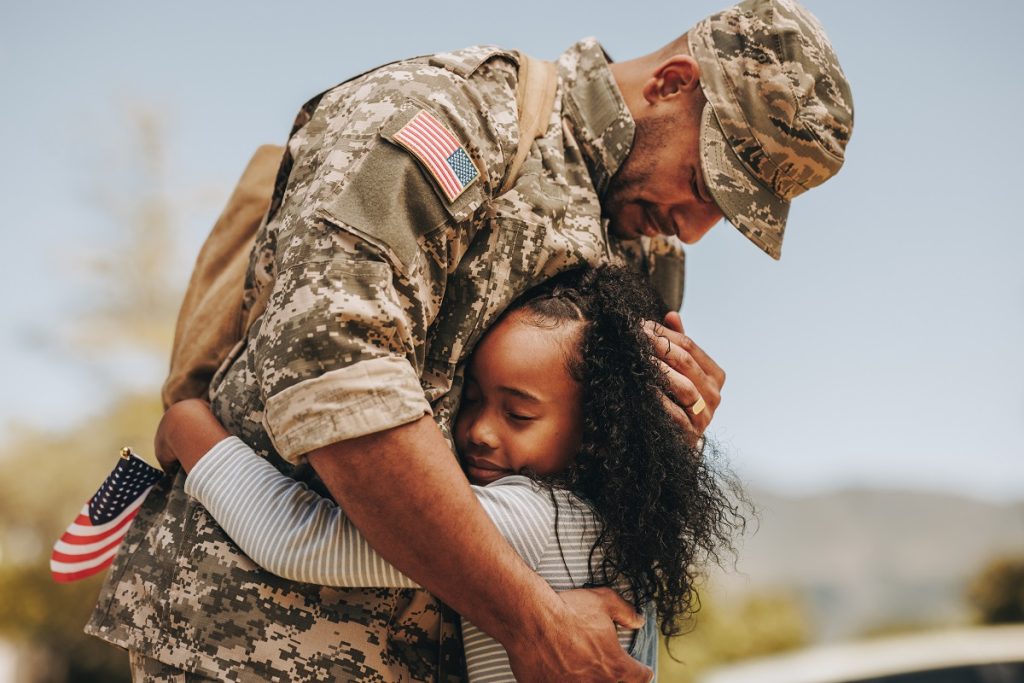
Going Away To College
Thank your family, friends, and mentors for the role they played in preparing you for college.
Highlight the opportunities for personal growth, intellectual development, and building new relationships.
Leaving Your Post In An Organization
Thank the organization for the opportunities, experiences, and support you received during your time in your position, expressing sincere gratitude to your colleagues, supervisors, and mentors for their guidance and collaboration.
Acknowledge the collective effort and teamwork of your colleagues, acknowledging their contributions and expressing gratitude for the collaboration and camaraderie experienced while working together.
Extend your best wishes to the organization, your colleagues, and the team to carry on the work and achieve future goals.
Who Should You Say Farewell To?
The specific individuals or groups you should say goodbye to vary depending on the context and your relationship with them. Here are some common groups of people you may consider saying farewell to:
- When leaving a job or transferring to another office, it is customary to say farewell to your colleagues and coworkers. This includes your immediate team members, colleagues from different departments, and those with whom you have collaborated closely.
- It is respectful to bid farewell to your supervisors and managers who have provided guidance, mentorship, and support during your time in the organization.
- If you have had a supervisory or leadership role, it is important to say goodbye to your subordinates or team members. Recognize their contributions, express appreciation for their efforts, and wish them continued success.
- If you have established relationships with clients or customers during your time in a business or professional setting, it can also be appropriate to say farewell to them. Express your appreciation, and provide any necessary transition information.
- Bid farewell to individuals you have forged close friendships or personal connections wit h, expressing appreciation for their friendship and expressing a desire to stay in touch.

How Do You Organize A Farewell Speech?
Organizing a farewell speech involves structuring your thoughts and ideas in a coherent and engaging manner. Here are some steps to help you organize your farewell speech effectively:
- Introduction: Start with a warm greeting and express gratitude for the opportunity to address the audience.
- State the purpose of your speech, whether it’s leaving a job, transferring to another office, or any other relevant context.
- Reflect on your time or experiences: Share your journey and highlight the significant moments, accomplishments, or challenges you encountered during your time in the role or organization.
- Mention specific projects, initiatives, or collaborations that were memorable or impactful.
- Express gratitude and appreciation: Thank the individuals or groups who have supported and influenced you throughout your journey.
- Acknowledge the contributions of colleagues, supervisors, mentors, and other important figures who have played a role in your success.
- Share well wishes and future aspirations: Extend your best wishes to the organization, colleagues, and teammates, expressing confidence in their future endeavors.
- Offer words of encouragement and support for ongoing projects or initiatives, showing your continued investment in their success.
- Closing: Wrap up your speech by reflecting on the lessons learned and personal growth you have experienced.
- Conclude with a heartfelt thank you and express your gratitude once again.
- Leave the audience with a positive and inspiring note , emphasizing the value of the connections made and the growth experienced.
Remember to keep your speech concise, engaging, and personalized. Use appropriate humor, storytelling, and anecdotes to connect with the audience. Practice your speech to ensure smooth delivery and maintain a genuine and sincere tone throughout.
How Can You Make Your Farewell Speech Memorable?
To make your farewell speech memorable, consider incorporating the following tips:
- Share personal anecdotes , stories, or experiences that are meaningful to you and relevant to your time in the organization.
- Be authentic and let your emotions come through in your speech. Share your gratitude, joy, nostalgia, or even a touch of humor.
- Paint a vivid picture with your words , using descriptive language and imagery to evoke emotions and create a memorable experience for the audience. Use metaphors, similes, or powerful statements to make your speech more impactful.
- Humor can make your farewell speech more engaging and memorable. Share funny anecdotes or witty remarks that relate to your time in the organization, but keep it appropriate and inclusive.
- Express genuine appreciation and gratitude to the individuals, teams, or the organization as a whole. Highlight specific contributions, support, or mentorship that made a difference to you.
- Deliver with confidence and passion , speak clearly, and use appropriate gestures and body language to convey your message.
- End your speech with a positive and uplifting message. Use the right words to leave the audience feeling inspired, motivated, and encouraged.
Farewell American Political Speeches
Farewell speeches have long held a significant place in American political history. From George Washington’s farewell address to modern-day presidential speeches, they have served as pivotal moments of reflection and transition. These speeches, delivered before Congress, the Senate, and the American people, capture the essence of a leader’s journey and their vision for the nation.
Presidents And Vice Presidents
Standing in the hallowed halls of the White House or addressing a crowd in New York, presidents and vice presidents have bid farewell to their political life, offering profound insights and farewell sayings. They have expressed gratitude to their fellow citizens and acknowledged the great nation they had the privilege to serve.
These farewell speeches have become a part of the history of the world, as they encapsulate the spirit of American democracy and the principles upon which it was built. They have sparked moments of contemplation and ignited a collective sense of pride and unity.
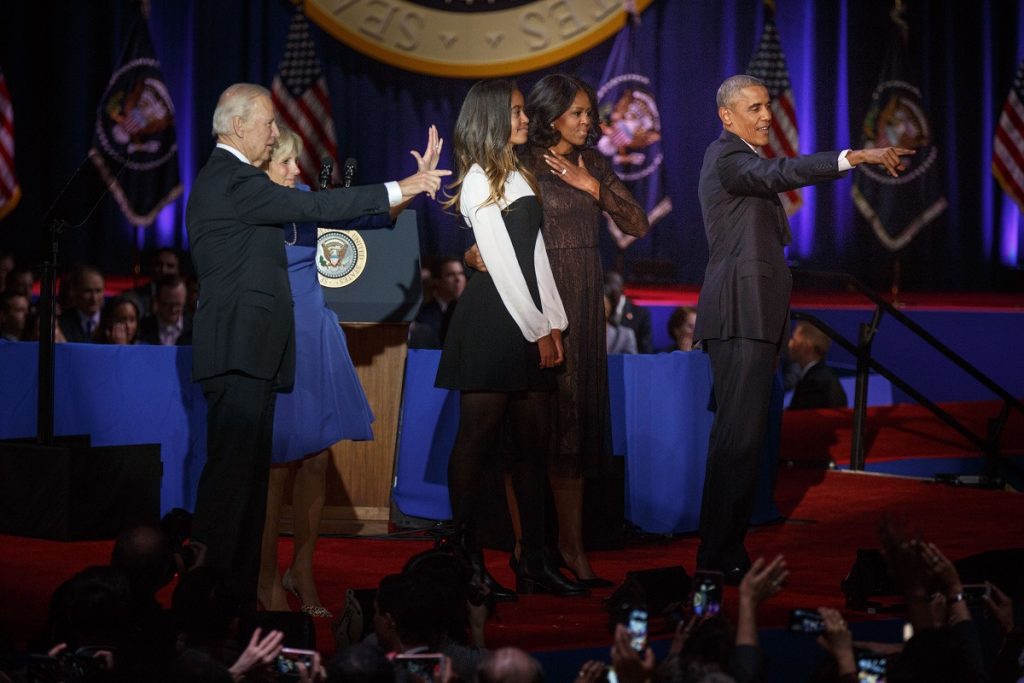
President Eisenhower
As President Eisenhower once said, “The last day in office does not mark the end, but rather the beginning of a new chapter.” These speeches serve as a powerful reminder that political transitions are part of the democratic process, and they inspire hope for the future.
In the State of the Union or before the United Nations, leaders have used their farewell speeches to reflect on their accomplishments and outline the path forward. These sample farewell speeches have set the stage for a peaceful transfer of power and reaffirmed the strength and resilience of American democracy.
Adam Howarth
Adam covers the topic of Public Speaking for Digital Authority. From his first experience of oratory with his school debating society to his more recent experiences of promoting the local business scene in Wrexham, Wales, he has always been involved in public speaking.
Recent Posts
Active Listening Absorbs The Whole Message, Not Just The Words
Active listening goes beyond hearing the words someone is saying to you and understanding the message they are conveying. Many only hear a small percentage of what is being said as they are...
Counteracting Fear Of Public Speaking With Coaching And Therapy
Nearly 75% of people experience the social phobia of fear of public speaking. The result may be nervousness before speaking or a full-blown panic attack. Practicing public speaking may lessen the...
- PRO Courses Guides New Tech Help Pro Expert Videos About wikiHow Pro Upgrade Sign In
- EDIT Edit this Article
- EXPLORE Tech Help Pro About Us Random Article Quizzes Request a New Article Community Dashboard This Or That Game Popular Categories Arts and Entertainment Artwork Books Movies Computers and Electronics Computers Phone Skills Technology Hacks Health Men's Health Mental Health Women's Health Relationships Dating Love Relationship Issues Hobbies and Crafts Crafts Drawing Games Education & Communication Communication Skills Personal Development Studying Personal Care and Style Fashion Hair Care Personal Hygiene Youth Personal Care School Stuff Dating All Categories Arts and Entertainment Finance and Business Home and Garden Relationship Quizzes Cars & Other Vehicles Food and Entertaining Personal Care and Style Sports and Fitness Computers and Electronics Health Pets and Animals Travel Education & Communication Hobbies and Crafts Philosophy and Religion Work World Family Life Holidays and Traditions Relationships Youth
- Browse Articles
- Learn Something New
- Quizzes Hot
- This Or That Game
- Train Your Brain
- Explore More
- Support wikiHow
- About wikiHow
- Log in / Sign up
- Education and Communications
- Communication Skills
- Public Speaking
How to Make a Farewell Speech
Last Updated: December 30, 2022 Fact Checked
This article was co-authored by Patrick Muñoz . Patrick is an internationally recognized Voice & Speech Coach, focusing on public speaking, vocal power, accent and dialects, accent reduction, voiceover, acting and speech therapy. He has worked with clients such as Penelope Cruz, Eva Longoria, and Roselyn Sanchez. He was voted LA's Favorite Voice and Dialect Coach by BACKSTAGE, is the voice and speech coach for Disney and Turner Classic Movies, and is a member of Voice and Speech Trainers Association. There are 10 references cited in this article, which can be found at the bottom of the page. This article has been fact-checked, ensuring the accuracy of any cited facts and confirming the authority of its sources. This article has been viewed 276,099 times.
Writing a farewell speech can seem like a daunting task. It can be hard to find the right words for your last day, whether it's your graduation, retirement, or any other occasion. You want to try to sum up your experiences, thank everyone involved, and offer wishes for the future, and do it all with grace and charm. This is a difficult task, but with some careful thought, you can write the perfect farewell speech.
Writing Your Speech

- Your outline can be as detailed as you'd like.
- Your outline should contain spaces for an opening, the body of the speech, and a tight conclusion.
- An outline doesn’t contain the complete text of the speech. It simply has bullet points and summaries of each section.

- An ice breaker might be some kind of inside joke or chant that everyone present would know about and be able to appreciate.
- If one of the anecdotes you wrote down is particularly funny or snappy, it could make a good opener as well.
- Sometimes a quote or inspirational message can work well as an opener, though you may want to save this for your closer.

- When speaking generally or summarizing, remember to, “show, don’t tell.” This means that it’s usually stronger to be specific and give details or examples, rather than generalizing.
- An example of “show, don’t tell” is saying, “On my first day of work, I noticed that half of the office stayed an extra half hour after closing time to make sure the reports were done,” instead of, “Everyone here always works extra hard.”

- You can search for great quotes online by subject. There are quotes for almost every occasion.
- If you’re particularly clever, you can end with a punchline that ties together with a joke or anecdote you told at the beginning of your speech.
- For example, if you started the speech with something like, “I’ll never forget my first day here. I thought I was doomed when I walked in the door and saw that I was twenty minute late,” you could close the speech with, “Well, I guess that’s all I have time for. Look at this. Five years later, and still running twenty minutes behind.”
Choosing What to Say

- Try writing down a narrative history of your time at this place. It doesn’t have to all be appropriate for a speech. Simply write it down to help yourself remember everything you’ve done, and to help yourself realize what has been the most meaningful to you.
- Your narrative may start with something like, “I came to work here right out of college and had never lived on my own before. I was so shy that I didn’t make any friends for nine months. Then I got that promotion a year later and formed close bonds within my new department.”
- It’s okay to write down things that were difficult. You can edit them out later. You might include something like, “I hated when we had to move to the new office.” When you edit your speech, this may turn into a funny anecdote, or maybe you’ll say something like, “Even when we had to move to the new office, I couldn’t help but notice how cheerful my colleagues managed to be in a hard time.”

- An anecdote might start out something like this: “I’ll always remember my third day of school. Spencer and I had been assigned to sit next to each other on the bus, but on the third day, my grandmother followed me onto the bus and declared she’d need to have a word with Spencer…”
- Anecdotes can be great ways to express appreciation for a specific person, or to illustrate something you appreciate about the place as a whole. For example, the above anecdote might end with something like, “...and of course, he’s never left my side since then,” or, “...which is how I knew that this school community would finally be a place that I’d feel at home.”

- Think of things you’re grateful for, or moments that helped you become who you are. Make a note of something like, “when John stood up for me freshman year,” or, “when the boss actually brought my proposal to the board and I realized that my voice mattered.”
- Think about the reasons you’re sad to go. This could be something like, “I know that a group of people who look out for each other like this is a rare thing to find,” or, “I learned so much from each person here, it will be sad to move on without everyone.”

- You can offer wishes for the group in general, such as, “Of course, next year, I’m sure you’ll all finally get to nationals without me on the team.”
- You can also offer individual good wishes, such as, “Janet, I hope you have an easy transition to being vice president; I know you’ll do great. Richard, good luck taking over the entire smoothing department.”
- You can also state hopes and wishes you have for yourself, such as, “I don’t know what’s next for me, but I certainly hope it involves people as kind as all of you.”
Delivering Your Speech

- Go over any parts that seem confusing or that don’t flow easily. Make any notes or changes that will be helpful when delivering the speech.
- Time the speech when you recite it.

- A farewell speech should usually be about five minutes long. Ten minutes is acceptable in certain circumstances. More than that should be reserved for extremely special circumstances, such as when a head of state resigns.

- Know that you may make a mistake. Be prepared for this. Don't beat yourself up if it happens. Acknowledge it and move on. You can even laugh at yourself to help put the audience at ease.
- Focus on people who seem to connect to your speech. If they're nodding, smiling, or have their eyes glued to you, focus on them. Their energy will help give you confidence.
Community Q&A
- When in doubt, keep it positive. People will keep the memory of the positive feelings for a long time after you’re gone. Thanks Helpful 2 Not Helpful 0
- If you’re going to make jokes about others, make sure they’re clearly light hearted and couldn’t be perceived as mean. Thanks Helpful 1 Not Helpful 0

You Might Also Like

- ↑ Patrick Muñoz. Voice & Speech Coach. Expert Interview. 12 November 2019.
- ↑ https://www.bbc.co.uk/bitesize/topics/zv7fqp3/articles/z4w96v4
- ↑ https://www.forbes.com/sites/jeffschmitt/2013/07/16/10-keys-to-writing-a-speech/?sh=3eff35264fb7
- ↑ https://finley-h.schools.nsw.gov.au/content/dam/doe/sws/schools/f/finley-h/localcontent/how_to_write_a_speech.pdf
- ↑ https://www.ohlone.edu/sites/default/files/documents/imported/samplestudentnarrativespeech-outline.pdf
- ↑ https://canvas.santarosa.edu/courses/22355/assignments/92237?module_item_id=350284
- ↑ https://open.lib.umn.edu/publicspeaking/chapter/9-2-the-attention-getter-the-first-step-of-an-introduction/
- ↑ https://www.indeed.com/career-advice/career-development/giving-a-farewell-speech-at-work
- ↑ http://www.greatspeech.co.uk/farewell-speech-if-leaving-company.html
- ↑ http://www.huffingtonpost.com/nikki-stone/confident-public-speaking_b_4058830.html

About This Article

Before you make your farewell speech, write an outline to organize your thoughts. Open with a joke or funny anecdote to grab the audience’s attention. The body of your speech should summarize your time there and include specific stories to express your feelings about the people and place. Conclude your speech with a quote or a punchline, depending on if you want to leave on a serious or funny note. Then, once your speech is written, practice so it will flow easily. For tips on how to give your speech confidently, keep reading! Did this summary help you? Yes No
- Send fan mail to authors
Reader Success Stories
Delvin Saji
Apr 18, 2018
Did this article help you?
Sumal Perera
Apr 5, 2019
Onwuka Charles
Feb 20, 2019
Ayush Bhatt
Mar 8, 2016
Pushpam Mani
Jul 22, 2017

Featured Articles

Trending Articles

Watch Articles

- Terms of Use
- Privacy Policy
- Do Not Sell or Share My Info
- Not Selling Info
Get all the best how-tos!
Sign up for wikiHow's weekly email newsletter
How to write a memorial, and other types of farewell speeches
By: Susan Dugdale | Last modified: 08-04-2021
Finding the right words to say goodbye
Does your mind go blank when you want to farewell someone you care about?
If so, you are not alone. Despite knowing endings are inevitable, that we are going to have to say goodbye many times over the course of our lives, we often struggle to find the words we want to express our thoughts and feelings.
Instead we 'um' and 'ah'. Or reach for a handy catch-all cliché to cover the awkwardness of not knowing what else to say, like telling a dear friend, whose partner has recently died, 'Time heals all wounds'. (Please, don't.)
Or sometimes we say nothing, even though we want to speak; sidestepping our feelings of inadequacy by avoiding, both the people and, the situations that might provoke them.
Most of us want do better. And we'd like to be shown how.
Guidelines for eulogies, farewell & retirement speeches
If that's you, you're in the right place. That's exactly the purpose of this site.
wordsforgoodbye.com offers guidelines, and examples of speeches, to help you mark a significant ending, a life changing event, with a speech honoring the occasion, and the people at its center.
Look around. Take your time. You'll find what you need to help you prepare the words to say goodbye the way you want to. You can begin now by clicking on the label of your choice below.
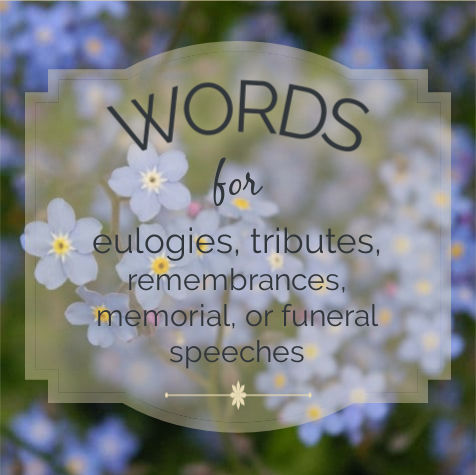
Hello. Goodbye.
Hellos and goodbyes are inseparable. Lock stepped: like pepper and salt, king and queen, right and left. A pair.
Where there are beginnings, there will also be endings. That's an inescapable, universal truth: a fact of living.
And, what we think, feel, or do, about them won't stop them. That's another fact. Those beginnings and endings are going to keep right on happening.
Because, everything is cyclic. Day follows night, always. Birth is followed by death. Winter follows Autumn, which follows Summer, which follows Spring ...
Round, and round, and round.
Life's only real certainty is change. Nothing is static.
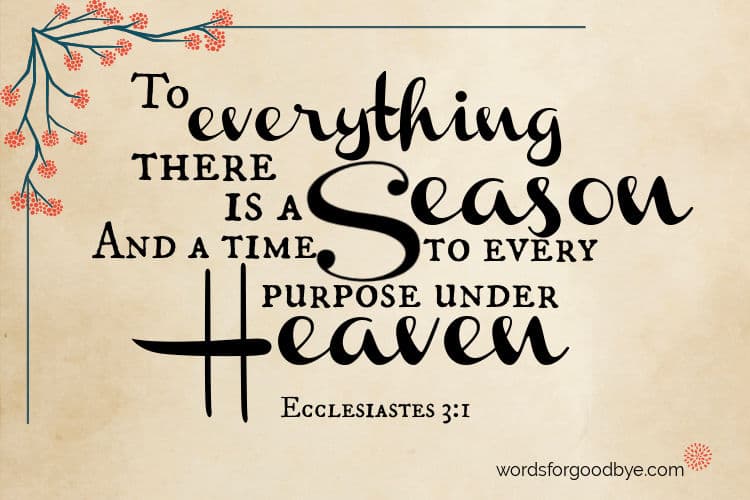
The importance of good goodbyes
When the endings in our lives are major we often feel the need to mark them meaningfully. A common way of doing that is with a gathering and a speech.
On the death of someone close to you, someone who has been a major presence in your life, the words you pull together to say goodbye at the funeral, is called a eulogy, a tribute and sometimes, a memorial speech.
When a much respected work colleague leaves to take up another position, a farewell speech from a senior staff member to mark the occasion may be in order. Or perhaps, if you are the person leaving, you want to give a goodbye speech to the people you've worked alongside.
Retirement is another transition often marked by a speech, either from the retiree, or from a representative of the organization the person is leaving.
Goodbyes like these are important. We remember them, and the words we heard. Hence, wordsforgoodbye.com because we want to say goodbye as sincerely, and as graciously, as we can.
I hope you find what you need.
Kind regards,
- Links to the latest articles
Funeral words: examples of comforting things to say at funerals
- Who speaks at a funeral? Who gives the eulogy?
- How to write a memorial tribute or eulogy
Sample eulogy - two memorial speech examples
- What's the difference between a eulogy, an elegy and a tribute?
Recent Articles
About words for goodbye

©Copyright 2024 www.wordsforgoodbye.com
- Partners: Bloggers
- Partners: Podasters
- Partners: Virtual Event Hosts
- Partners: Toastmasters Clubs
- Partners: Bookstores & Live Venues
- Partners: Sponsors
- Digital Press Kit
- What people are saying …
- Interior Art
- Acknowledgements
- Other Books by Carma
- Featured Speakers
- The Public Speaking Superhero’s Journey
- Individual Speaker Coaching
- Public Speaking Super Powers for Live Video
- Persuasive Speaking with Confidence
- Developing Your Leadership Skills
- Video Marketing Super Pack
- Wedding Speech Templates
- Creating Your Ideal Audience Avatar
- Public Speaking Superhero’s Journey
- Training & Mastermind Program
- Boost Your Self-Confidence 7-Day Challenge
- Speaking Palooza! 2019
- Recommended Reading
- For Book Clubs
- - ORDER NOW!
- - Partners: Bloggers
- - Partners: Podasters
- - Partners: Virtual Event Hosts
- - Partners: Toastmasters Clubs
- - Partners: Bookstores & Live Venues
- - Partners: Sponsors
- - Digital Press Kit
- - What people are saying …
- - Cover Art
- - Interior Art
- - Acknowledgements
- - Other Books by Carma
- - Contact
- - Excerpt
- - The Public Speaking Superhero’s Journey
- - Speaker
- - Individual Speaker Coaching
- - Public Speaking Super Powers for Live Video
- - Persuasive Speaking with Confidence
- - Developing Your Leadership Skills
- - Video Marketing Super Pack
- - Wedding Speech Templates
- - Creating Your Ideal Audience Avatar
- - Public Speaking Superhero’s Journey
- - Training & Mastermind Program
- - Boost Your Self-Confidence 7-Day Challenge
- - Speaking Palooza! 2019
- - Podcast
- - Recommended Reading
- - For Book Clubs
Types of Speeches: The Farewell Speech
A farewell speech is given when someone retires, graduates or moves on to another phase of their career. This is a ceremonial speech given by someone who had an impact on what he or she is leaving behind. This kind of speech is often emotionally charged because leaving can be bittersweet.

If you decide to become a professional speaker or use speaking as an integral part of your marketing strategy, it’s a good idea to familiarize yourself with the various types of speeches you might be asked to give. In this series of posts, I’ll give you the basics of a variety of types of presentations you can prepare. At the end of this post, I’ve listed previous articles in this series.
Sometimes the person who is leaving gives the farewell speech … sometimes it is someone else, saying goodbye. Regardless of which role you will be playing in giving a parting speech, these tips should help you develop something that honors the situation.
Tips for developing an awesome farewell speech
Who is your audience? Who will be listening to your speech? Are they your colleagues? friends? family members? Keep in mind your audience and you develop the tone of your speech. For one audience there will be more sentiment, for another more humor, and for yet another more solemnity. Choose the right tone for your listeners.
Time it right Different venues and situations call for different lengths of goodbye speeches. Find out in advance how much time you have been allotted.
Personalize the presentation Include quotes, anecdotes and interesting stories in your farewell speech. This is the time to illustrate why you are sad to go but happily looking forward, as well.
Create a central message or theme A core message for your farewell speech will help tie everything together and make it easier to develop the content of your presentation. This message can be a summation of the impact the person leaving has made or a parting inspiration for those who are left behind.
Express gratitude Be sure to express appreciation for the time spent at the place being left. If you are the one leaving, be thankful for your time there. If someone else is leaving, be grateful for the time they spent with you. This person made an impact, or a farewell speech wouldn’t be in order.
Be authentic It is especially important for a farewell speech to be given in a relaxed, humanly authentic manner. Don’t read the speech. Don’t be stuffy. Be genuine and natural.
Resources for developing an awesome farewell speech
- Words for When It’s Time to Say Goodbye
- How to give a leaving speech
- How To Write A Farewell Speech by Jennie Amit Gandhi
Did you miss these?
Here are the previous posts in this “Type of Speeches” series:
- The Keynote Address
- The Training Session
- The Motivational Speech
- The Entertaining Speech
- The Demonstration
- The Information Dump
- The Inspirational Speech
- The Q & A
- The Persuasive Speech
- The Impromptu Speech
- The Acceptance Speech
- The Commencement Speech
- The Interpretive Reading
- Presenting an Award
- Accepting an Award
- The After Dinner Talk
- The Wedding Speech
Did you like this post? Please share!
About the author
Carma Spence, is author of Public Speaking Super Powers. She is fiercely committed to guiding women to Owning their Superpowers and turning their knowledge and interests into a profitable business. She is masterful at helping her clients see what is possible for them and supporting them on the journey from where they are to where they want to be, releasing the Mind Goblins of self-doubt, self-sabotage and second-guessing that keep them stuck.
With 20+ years experience in marketing communications and public relations, natural intuitive skills and certification in using some of the most effective transformational coaching tools available, Carma’s mission and commitment is to unleash the inner power every woman entrepreneur possesses so they can boldly go out into the world, transforming the fabric of people’s lives in meaningful and positive ways.
You can find her on Facebook , Twitter , Google+ and LinkedIn . Her website is CarmaSpence.com .

Want to create or adapt books like this? Learn more about how Pressbooks supports open publishing practices.
18.2 Special-Occasion Speeches
Learning objectives.
- Identify the different types of ceremonial speaking.
- Describe the different types of inspirational speaking.
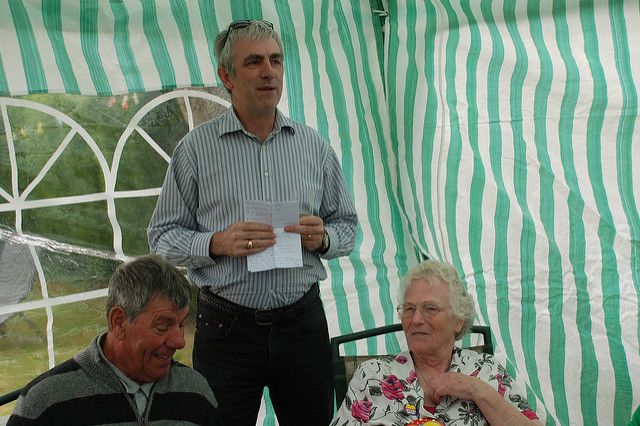
M+MD – Birthday Speech – CC BY-NC-ND 2.0.
Many entertaining speeches fall under the category of special-occasion speeches. All the speeches in this category are given to mark the significance of particular events. Common events include weddings, bar mitzvahs, awards ceremonies, funerals, and political events. In each of these different occasions, speakers are asked to deliver speeches relating to the event. For purposes of simplicity, we’ve broken special-occasion speeches into two groups: ceremonial speaking and inspirational speaking.
Ceremonial Speaking
Ceremonial speeches are speeches given during a ceremony or a ritual marked by observance of formality or etiquette. These ceremonies tend to be very special for people, so it shouldn’t be surprising that they are opportunities for speech making. Let’s examine each of the eight types of ceremonial speaking: introductions, presentations, acceptances, dedications, toasts, roasts, eulogies, and farewells.
Speeches of Introduction
The first type of speech is called the speech of introduction , which is a minispeech given by the host of a ceremony that introduces another speaker and his or her speech. Few things are worse than when the introducer or a speaker stands up and says, “This is Joe Smith, he’s going to talk about stress.” While we did learn the speaker’s name and the topic, the introduction falls flat. Audiences won’t be the least bit excited about listening to Joe’s speech.
Just like any other speech, a speech of introduction should be a complete speech and have a clear introduction, body, and conclusion—and you should do it all in under two minutes. This brings up another “few things are worse” scenario: an introductory speaker who rambles on for too long or who talks about himself or herself instead of focusing on the person being introduced.
For an introduction, think of a hook that will make your audience interested in the upcoming speaker. Did you read a news article related to the speaker’s topic? Have you been impressed by a presentation you’ve heard the speaker give in the past? You need to find something that can grab the audience’s attention and make them excited about hearing the main speaker.
The body of your introductory speech should be devoted to telling the audience about the speaker’s topic, why the speaker is qualified, and why the audience should listen (notice we now have our three body points). First, tell your audience in general terms about the overarching topic of the speech. Most of the time as an introducer, you’ll only have a speech title and maybe a paragraph of information to help guide this part of your speech. That’s all right. You don’t need to know all the ins and outs of the main speaker’s speech; you just need to know enough to whet the audience’s appetite. Next, you need to tell the audience why the speaker is a credible speaker on the topic. Has the speaker written books or articles on the subject? Has the speaker had special life events that make him or her qualified? Lastly, you need to briefly explain to the audience why they should care about the upcoming speech.
The final part of a good introduction is the conclusion, which is generally designed to welcome the speaker to the lectern. Many introducers will conclude by saying something like, “I am looking forward to hearing how Joe Smith’s advice and wisdom can help all of us today, so please join me in welcoming Mr. Joe Smith.” We’ve known some presenters who will even add a notation to their notes to “start clapping” and “shake speakers hand” or “give speaker a hug” depending on the circumstances of the speech.
Now that we’ve walked through the basic parts of an introductory speech, let’s see one outlined:
Specific Purpose: To entertain the audience while preparing them for Janice Wright’s speech on rituals.
Introduction: Mention some common rituals people in the United States engage in (Christmas, sporting events, legal proceedings).
Main Points:
- Explain that the topic was selected because understanding how cultures use ritual is an important part of understanding what it means to be human.
- Janice Wright is a cultural anthropologist who studies the impact that everyday rituals have on communities.
- All of us engage in rituals, and we often don’t take the time to determine how these rituals were started and how they impact our daily routines.
Conclusion: I had the opportunity to listen to Dr. Wright at the regional conference in Springfield last month, and I am excited that I get to share her with all of you tonight. Please join me in welcoming Dr. Wright (start clapping, shake speaker’s hand, exit stage).
Speeches of Presentation
The second type of common ceremonial speech is the speech of presentation . A speech of presentation is a brief speech given to accompany a prize or honor. Speeches of presentation can be as simple as saying, “This year’s recipient of the Schuman Public Speaking prize is Wilhelmina Jeffers,” or could last up to five minutes as the speaker explains why the honoree was chosen for the award.
When preparing a speech of presentation, it’s always important to ask how long the speech should be. Once you know the time limit, then you can set out to create the speech itself. First, you should explain what the award or honor is and why the presentation is important. Second, you can explain what the recipient has accomplished in order for the award to be bestowed. Did the person win a race? Did the person write an important piece of literature? Did the person mediate conflict? Whatever the recipient has done, you need to clearly highlight his or her work. Lastly, if the race or competition was conducted in a public forum and numerous people didn’t win, you may want to recognize those people for their efforts as well. While you don’t want to steal the show away from winner (as Kanye West did to Taylor Swift during the 2009 MTV Music Video Awards, for example http://www.mtv.com/videos/misc/435995/taylor-swift-wins-best-female-video.jhtml#id=1620605 ), you may want to highlight the work of the other competitors or nominees.
Speeches of Acceptance
The complement to a speech of presentation is the speech of acceptance . The speech of acceptance is a speech given by the recipient of a prize or honor. For example, in the above video clip from the 2009 MTV Music Video Awards, Taylor Swift starts by expressing her appreciation, gets interrupted by Kanye West, and ends by saying, “I would like to thank the fans and MTV, thank you.” While obviously not a traditional acceptance speech because of the interruption, she did manage to get in the important parts.
There are three typical components of a speech of acceptance: thank the givers of the award or honor, thank those who helped you achieve your goal, and put the award or honor into perspective. First, you want to thank the people who have given you the award or honor and possibly those who voted for you. We see this done every year during the Oscars, “First, I’d like to thank the academy and all the academy voters.” Second, you want to give credit to those who helped you achieve the award or honor. No person accomplishes things in life on his or her own. We all have families and friends and colleagues who support us and help us achieve what we do in life, and a speech of acceptance is a great time to graciously recognize those individuals. Lastly, put the award in perspective. Tell the people listening to your speech why the award is meaningful to you.
Speeches of Dedication
The fourth ceremonial speech is the speech of dedication . A speech of dedication is delivered when a new store opens, a building is named after someone, a plaque is placed on a wall, a new library is completed, and so on. These speeches are designed to highlight the importance of the project and possibly those to whom the project has been dedicated. Maybe your great-uncle has died and left your college tons of money, so the college has decided to rename one of the dorms after your great-uncle. In this case, you may be asked to speak at the dedication.
When preparing the speech of dedication, start by explaining how you are involved in the dedication. If the person to whom the dedication is being made is a relative, tell the audience that the building is being named after your great-uncle who bestowed a gift to his alma mater. Second, you want to explain what is being dedicated. If the dedication is a new building or a preexisting building, you want to explain what is being dedicated and the importance of the structure. You should then explain who was involved in the project. If the project is a new structure, talk about the people who built the structure or designed it. If the project is a preexisting structure, talk about the people who put together and decided on the dedication. Lastly, explain why the structure is important for the community where it’s located. If the dedication is for a new store, talk about how the store will bring in new jobs and new shopping opportunities. If the dedication is for a new wing of a hospital, talk about how patients will be served and the advances in medicine the new wing will provide the community.
At one time or another, almost everyone is going to be asked to deliver a toast . A toast is a speech designed to congratulate, appreciate, or remember. First, toasts can be delivered for the purpose of congratulating someone for an honor, a new job, or getting married. You can also toast someone to show your appreciation for something they’ve done. Lastly, we toast people to remember them and what they have accomplished.
When preparing a toast, the first goal is always to keep your remarks brief. Toasts are generally given during the middle of some kind of festivities (e.g., wedding, retirement party, farewell party), and you don’t want your toast to take away from those festivities for too long. Second, the goal of a toast is to focus attention on the person or persons being toasted—not on the speaker. As such, while you are speaking you need to focus your attention to the people being toasted, both by physically looking at them and by keeping your message about them. You should also avoid any inside jokes between you and the people being toasted because toasts are public and should be accessible for everyone who hears them. To conclude a toast, simply say something like, “Please join me in recognizing Joan for her achievement” and lift your glass. When you lift your glass, this will signal to others to do the same and then you can all take a drink, which is the end of your speech.
The roast speech is a very interesting and peculiar speech because it is designed to both praise and good-naturedly insult a person being honored. Generally, roasts are given at the conclusion of a banquet in honor of someone’s life achievements. The television station Comedy Central has been conducting roasts of various celebrities for a few years.
In this clip, watch as Stephen Colbert, television host of The Colbert Report , roasts President George W. Bush.
http://www.youtube.com/watch?v=BSE_saVX_2A
Let’s pick this short clip apart. You’ll notice that the humor doesn’t pull any punches. The goal of the roast is to both praise and insult in a good-natured manner. You’ll also see that the roaster, in this case Stephen Colbert, is standing behind a lectern while the roastee, President George W. Bush, is clearly on display for the audience to see, and periodically you’ll see the camera pan to President Bush to take in his reactions. Half the fun of a good roast is watching the roastee’s reactions during the roast, so it’s important to have the roastee clearly visible by the audience.
How does one prepare for a roast? First, you want to really think about the person who is being roasted. Do they have any strange habits or amusing stories in their past that you can discuss? When you think through these things you want to make sure that you cross anything off your list that is truly private information or will really hurt the person. The goal of a roast is to poke at them, not massacre them. Second, when selecting which aspects to poke fun at, you need to make sure that the items you choose are widely known by your audience. Roasts work when the majority of people in the audience can relate to the jokes being made. If you have an inside joke with the roastee, bringing it up during roast may be great fun for the two of you, but it will leave your audience unimpressed. Lastly, end on a positive note. While the jokes are definitely the fun part of a roast, you should leave the roastee knowing that you truly do care about and appreciate the person.
A eulogy is a speech given in honor of someone who has died. (Don’t confuse “eulogy” with “elegy,” a poem or song of mourning.) Unless you are a minister, priest, rabbi, imam, or other form of religious leader, you’ll probably not deliver too many eulogies in your lifetime. However, when the time comes to deliver a eulogy, it’s good to know what you’re doing and to adequately prepare your remarks. Watch the following clip of then-Senator Barack Obama delivering a eulogy at the funeral of civil rights activist Rosa Parks in November of 2005.
http://www.youtube.com/watch?v=pRsH92sJCr4
In this eulogy, Senator Obama delivers the eulogy by recalling Rosa Parks importance and her legacy in American history.
When preparing a eulogy, first you need to know as much information about the deceased as possible. The more information you have about the person, the more personal you can make the eulogy. While you can rely on your own information if you were close to the deceased, it is always a good idea to ask friends and relatives of the deceased for their memories, as these may add important facets that may not have occurred to you. Of course, if you were not very close to the deceased, you will need to ask friends and family for information. Second, although eulogies are delivered on the serious and sad occasion of a funeral or memorial service for the deceased, it is very helpful to look for at least one point to be lighter or humorous. In some cultures, in fact, the friends and family attending the funeral will expect the eulogy to be highly entertaining and amusing. While eulogies are not roasts, one goal of the humor or lighter aspects of a eulogy is to relieve the tension that is created by the serious nature of the occasion. Lastly, remember to tell the deceased’s story. Tell the audience about who this person was and what the person stood for in life. The more personal you can make a eulogy, the more touching it will be for the deceased’s friends and families. The eulogy should remind the audience to celebrate the person’s life as well as mourn their death.
Speeches of Farewell
A speech of farewell allows someone to say good-bye to one part of his or her life as he or she is moving on to the next part of life. Maybe you’ve accepted a new job and are leaving your current job, or you’re graduating from college and entering the work force. Whatever the case may be, periods of transition are often marked by speeches of farewell. Watch the following clip of Derek Jeter’s 2008 speech saying farewell to Yankee Stadium, built in 1923, before the New York Yankees moved to the new stadium that opened in 2009.
http://www.youtube.com/watch?v=HJrlTpQm0to
In this speech, Derek Jeter is not only saying good-bye to Yankee Stadium but also thanking the fans for their continued support.
When preparing a speech of farewell, the goal should be to thank the people in your current position and let them know how much you appreciate them as you make the move to your next position in life. In Derek Jeter’s speech, he starts by talking about the history of the 1923 Yankee Stadium and then thanks the fans for their support. Second, you want to express to your audience how much the experience has meant to you. A farewell speech is a time to commemorate and think about the good times you’ve had. As such, you should avoid negativity during this speech. Lastly, you want to make sure that you end on a high note. Derek Jeter concludes his speech by saying, “On behalf of this entire organization, we just want to take this moment to salute you, the greatest fans in the world!” at which point Jeter and the other players take off their ball caps and hold them up toward the audience.
Inspirational Speaking
The goal of an inspirational speech is to elicit or arouse an emotional state within an audience. In Section 18.2.1 “Ceremonial Speaking” , we looked at ceremonial speeches. Although some inspirational speeches are sometimes tied to ceremonial occasions, there are also other speaking contexts that call for inspirational speeches. For our purposes, we are going to look at two types of inspirational speeches: goodwill and speeches of commencement.
Speeches to Ensure Goodwill
Goodwill is an intangible asset that is made up of the favor or reputation of an individual or organization. Speeches of goodwill are often given in an attempt to get audience members to view the person or organization more favorably. Although speeches of goodwill are clearly persuasive, they try not to be obvious about the persuasive intent and are often delivered as information-giving speeches that focus on an individual or organization’s positives attributes. There are three basic types of speeches of goodwill: public relations, justification, and apology.
Speeches for Public Relations
In a public relations speech, the speaker is speaking to enhance one’s own image or the image of his or her organization. You can almost think of these speeches as cheerleading speeches because the ultimate goal is to get people to like the speaker and what he or she represents. In the following brief speech, the CEO of British Petroleum is speaking to reporters about what his organization is doing during the 2010 oil spill in the Gulf of Mexico.
http://www.youtube.com/watch?v=cCfa6AxmUHw
Notice that he keeps emphasizing what his company is doing to fix the problem. Every part of this speech is orchestrated to make BP look caring and attempts to get some amount of goodwill from the viewing public.
Speeches of Justification
The second common speech of goodwill is the speech of justification, which is given when someone attempts to defend why certain actions were taken or will be taken. In these speeches, speakers have already enacted (or decided to enact) some kind of behavior, and are now attempting to justify why the behavior is or was appropriate. In the following clip, President Bill Clinton discusses his decision to bomb key Iraqi targets after uncovering a plot to assassinate former President George H. W. Bush.
http://www.youtube.com/watch?v=6mpWa7wNr5M
In this speech, President Clinton outlines his reasons for bombing Iraq to the American people and the globe. Again, the goal of this speech is to secure goodwill for President Clinton’s decisions both in the United States and on the world stage.
Speeches of Apology
The final speech of goodwill is the speech of apology. Frankly, these speeches have become more and more commonplace. Every time we turn around, a politician, professional athlete, musician, or actor/actress is doing something reprehensible and getting caught. In fact, the speech of apology has quickly become a fodder for humor as well. Let’s take a look at a real apology speech delivered by professional golfer Tiger Woods.
http://www.youtube.com/watch?v=Xs8nseNP4s0
When you need to make an apology speech, there are three elements that you need to include: be honest and take responsibility, say you’re sorry, and offer restitution. First, a speaker needs to be honest and admit to doing something wrong. The worst apology speeches are those in which the individual tries to sidestep the wrongdoing. Even if you didn’t do anything wrong, it is often best to take responsibility from a public perception perspective. Second, say that you are sorry. People need to know that you are remorseful for what you’ve done. One of the problems many experts saw with Tiger Woods’s speech is that he doesn’t look remorseful at all. While the words coming out of his mouth are appropriate, he looks like a robot forced to read from a manuscript written by his press agent. Lastly, you need to offer restitution. Restitution can come in the form of fixing something broken or a promise not to engage in such behavior in the future. People in society are very willing to forgive and forget when they are asked.
Speeches for Commencements
The second type of inspirational speech is the speech of commencement , which is designed to recognize and celebrate the achievements of a graduating class or other group of people. The most typical form of commencement speech happens when someone graduates from school. Nearly all of us have sat through commencement speeches at some point in our lives. And if you’re like us, you’ve heard good ones and bad ones. Numerous celebrities and politicians have been asked to deliver commencement speeches at colleges and universities. One famous and well-thought-out commencement speech was given by famed Harry Potter author J. K. Rowling at Harvard University in 2008.
http://www.youtube.com/watch?v=nkREt4ZB-ck
J. K. Rowling’s speech has the perfect balance of humor and inspiration, which are two of the main ingredients of a great commencement speech.
If you’re ever asked to deliver a commencement speech, there are some key points to think through when deciding on your speech’s content.
- If there is a specific theme for the graduation, make sure that your commencement speech addresses that theme. If there is no specific theme, come up with one for your speech. Some common commencement speech themes are commitment, competitiveness, competence, confidence, decision making, discipline, ethics, failure (and overcoming failure), faith, generosity, integrity, involvement, leadership, learning, persistence, personal improvement, professionalism, reality, responsibility, and self-respect.
- Talk about your life and how graduates can learn from your experiences to avoid pitfalls or take advantages of life. How can your life inspire the graduates in their future endeavors?
- Make the speech humorous. Commencement speeches should be entertaining and make an audience laugh.
- Be brief! Nothing is more painful than a commencement speaker who drones on and on. Remember, the graduates are there to get their diplomas; their families are there to watch the graduates walk across the stage.
- Remember, while you may be the speaker, you’ve been asked to impart wisdom and advice for the people graduating and moving on with their lives, so keep it focused on them.
- Place the commencement speech into the broader context of the graduates’ lives. Show the graduates how the advice and wisdom you are offering can be utilized to make their own lives better.
Overall, it’s important to make sure that you have fun when delivering a commencement speech. Remember, it’s a huge honor and responsibility to be asked to deliver a commencement speech, so take the time to really think through and prepare your speech.
Key Takeaways
- There are eight common forms of ceremonial speaking: introduction, presentation, acceptance, dedication, toast, roast, eulogy, and farewell. Speeches of introduction are designed to introduce a speaker. Speeches of presentation are given when an individual is presenting an award of some kind. Speeches of acceptance are delivered by the person receiving an award or honor. Speeches of dedication are given when a new building or other place is being opened for the first time. Toasts are given to acknowledge and honor someone on a special occasion (e.g., wedding, birthday, retirement). Roasts are speeches designed to both praise and good-naturedly insult a person being honored. Eulogies are given during funerals and memorial services. Lastly, speeches of farewell are delivered by an individual who is leaving a job, community, or organization, and wants to acknowledge how much the group has meant.
- Inspirational speeches fall into two categories: goodwill (e.g., public relations, justification, and apology) and speeches of commencement. Speeches of goodwill attempt to get audience members to view the person or organization more favorably. On the other hand, speeches of commencement are delivered to recognize the achievements of a group of people.
- Imagine you’ve been asked to speak before a local civic organization such as the Kiwanis or Rotary Club. Develop a sample speech of introduction that you would like someone to give to introduce you.
- You’ve been asked to roast your favorite celebrity. Develop a two-minute roast.
- Develop a speech of commencement for your public speaking class.
Stand up, Speak out Copyright © 2016 by University of Minnesota is licensed under a Creative Commons Attribution-NonCommercial-ShareAlike 4.0 International License , except where otherwise noted.
Share This Book

Want to create or adapt books like this? Learn more about how Pressbooks supports open publishing practices.
14 Ceremonial Speaking
Learning objectives.
- Understand the different types of ceremonial speeches.
- Explain how to deliver a strong ceremonial speech in different contexts.
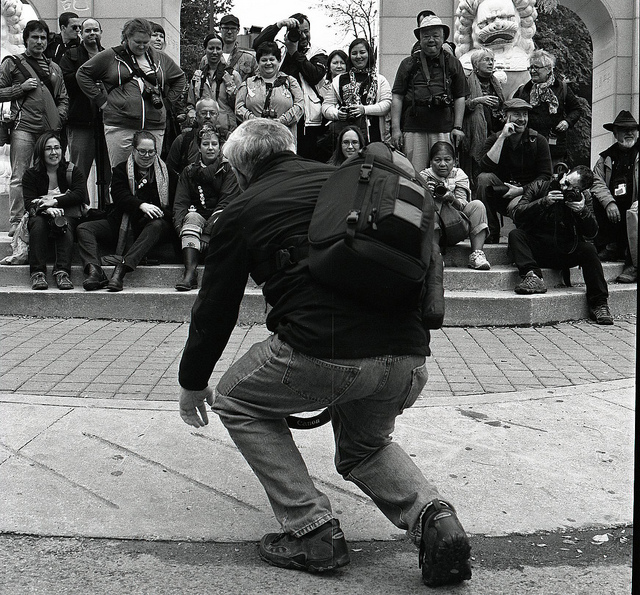
There are many occasions in which one may be called to speak that do not focus on informing or persuading an audience in the ways we’ve already discussed. Special occasions mark life events, celebrate milestones, and commemorate people and situations. The speeches delivered at these types of events provide perspective on the occasion, help the audience make sense of its significance, and can become a lasting part of the memories formed from the event. Whether you are standing up to give an award speech, a wedding toast, or a eulogy, knowing how to deliver speeches in a variety of different contexts is an important skill of public speaking. In this chapter, we will explore the functions of special occasion speeches, as well as several specific types of special occasion speeches, and four key items to remember when you are asked to deliver one these speeches at an event.
Functions of Special Occasion Speeches
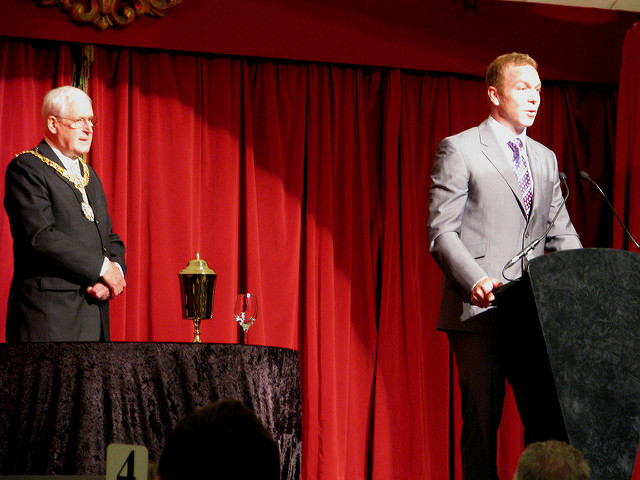
Chris Hill – Chris Hoy – Acceptance Speech – CC BY-NC-ND 2.0.
Entertain and Celebrate
While speeches intended to entertain an audience may be either informative or persuasive, the rhetorical situation often provides a clear indication of when a speech falls into the special occasion category. Consider roasts and toasts; both entertain and celebrate, albeit in different ways. An awards banquet and weddings are examples of special occasions that call for a speaker to present an upbeat, light speech designed to amuse the audience while celebrating a person, event, or situation.
Commemorate
When we think of a speech crafted to commemorate something or someone, perhaps a eulogy is the first type to come to mind. That is likely because a commemorative speech is one of tribute, and often remembrance, such as a eulogy or when a speaker recalls an anniversary or a milestone event. Speeches of commemoration can also include building or monument dedications that are designed to honor the memory of the person or situation that inspired the site.
Often the rhetorical situation calls for a speaker to present words of wisdom and guidance based upon their personal experiences or what they’ve learned through shared experiences of the audience they are addressing. Examples of this kind of inspirational speaking include one you’ve all likely already witnessed, the commencement speech. Another example is a keynote address at a conference or convention. An inaugural address is another type of speech designed to inspire audiences through the promise of the speaker’s vision for the future.
This textbook is dedicated to encouraging students to stand up and speak out and this type of special occasion speech encompasses the speeches in which individuals do just that. Speeches of advocacy focus on goals and values. They are often cause-oriented or crafted to impact policy-setting or change in some way. Speakers present advocacy speeches at special occasions such as fundraisers, campaign rallies, and even protests or marches.
Types of Special Occasion Speeches
If we consider the functions of special occasion speeches we’ve just reviewed, chances are we could come up with a myriad of different types of speeches that could be included in this section. For our purposes, we are going to focus on several special occasion speeches that you are likely to encounter in your academic, professional, and personal lives. By looking at common types of speeches, we hope to enable you with the tools to stand up and speak out in events and situations in which you may find yourselves given a platform to deliver a speech.
Speeches of Introduction
The first type of speech is called the speech of introduction. A speech of introduction is a short speech that introduces another speaker. There are two main goals of an introduction speech: to provide a bit of context, including who the speaker is and why that speaker will be giving a speech at the particular event, and to entice the audience to pay attention to what the speaker has to say.
Just like any other speech, a speech of introduction should have a clear introduction, body, and conclusion. The information should be delivered as concisely but informative as possible. For an introduction, think of a hook that will make your audience interested in the upcoming speaker. Did you read a news article related to the speaker’s topic? Have you been impressed by a presentation you’ve heard the speaker give in the past? You need to find something that can grab the audience’s attention and make them excited about hearing the main speaker.
The body of your speech of introduction should be devoted to telling the audience about the speaker’s topic, why the speaker is qualified, and why the audience should listen (notice we now have our three body points). First, tell your audience in general terms about the overarching topic of the speech. You may only have a speech title and maybe a paragraph of information to help guide this part of your speech. Remember, your role is to be concise and to the point. The speaker is the one who will elaborate on the topic. Next, you need to tell the audience why the speaker is a credible speaker on the topic. Has the speaker written books or articles on the subject? Has the speaker had special life events that make him or her qualified? Think about what you’ve learned about building ethos and do that for the speaker. Lastly, you need to briefly explain to the audience why they should care about the upcoming speech.
The final part of a good introduction speech is the conclusion. The conclusion is generally designed to welcome the speaker to the lectern. Many introduction speeches will conclude by saying something like, “I am looking forward to hearing how Joe Smith’s advice and wisdom can help all of us today, so please join me in welcoming Mr. Joe Smith.” We’ve known some presenters who will even add a notation to their notes to “start clapping,” “shake the speaker’s hand,” or “give the speaker a hug” depending on the circumstances of the speech.
Speeches of Presentation
The second type of ceremonial speech is the speech of presentation. A speech of presentation is a brief speech given to accompany a prize or honor. A speech of presentation could be as simple as saying, “This year’s recipient of the Schuman Public Speaking prize is Wilhelmina Jeffers,” or could last up to five minutes as the speaker explains why the honoree was chosen for the award.
When preparing a speech of presentation, it’s always important to ask how long the speech should be. Once you know the time limit, then you can set out to create the speech itself. First, you should explain what the award or honor is and why the presentation is important. Second, you can explain what the recipient has accomplished in order for the award to be bestowed. Did the person win a political race? Did the person write an important piece of literature? Did the person mediate conflict? Whatever the recipient has done, you need to clearly highlight their work. Lastly, if the race or competition was conducted in a public forum and numerous people didn’t win, you may want to recognize those people for their efforts as well. While you don’t want to steal the show away from the winner (as Kanye West did to Taylor Swift during the 2009 MTV Music Video Awards ( https://vimeo.com/173170491 ), you may want to highlight the work of the other competitors or nominees.
Speeches of Acceptance
The complement to a speech of presentation is the speech of acceptance. The speech of acceptance is a speech given by the recipient of a prize or honor. For example, in the above video clip from the 2009 MTV Music Video Awards, Taylor Swift starts by expressing her appreciation, gets interrupted by Kanye West, and ends by saying, “I would like to thank the fans and MTV, thank you.” While not a traditional acceptance speech because of the interruption, she did manage to get in the important parts.
There are three typical components of a speech of acceptance: thank the givers of the award or honor, thank those who helped you achieve your goal, and put the award or honor into perspective.
First, you want to thank the people who have given you the award or honor and possibly those who voted for you. We see this done every year during the Oscars, “First, I’d like to thank the academy and all of the academy voters.” Second, you want to give credit to those who helped you achieve the award or honor. No person accomplishes things in life on their own. We all have families, friends, and/or colleagues who support us and help us achieve what we do in life. A speech of acceptance is a great time to graciously recognize those individuals. Lastly, put the award in perspective. Tell the people listening to your speech why the award is meaningful to you.
Speeches of Dedication
The fourth ceremonial speech is the speech of dedication. A speech of dedication is delivered when a new store opens, a building is named after someone, a plaque is placed on a wall, a new library is completed, and so on. These speeches are designed to highlight the importance of the project and those to whom the project has been dedicated.
When preparing the speech of dedication, start by explaining your connection to the project and why you’ve been asked to speak. Next, you want to explain what is being dedicated and who was involved with the project, who made it possible. If the project is a new structure, talk about the people who built the structure or designed it. If the project is a preexisting structure, talk about the people who put together and decided on the dedication. You also want to explain why the structure is important and the impact it may have on the local community. For instance, if the dedication is for a new store, you could talk about how the store will bring in new jobs and shopping opportunities. If the dedication is for a new wing of a hospital, you could talk about how patients will be served and the advances in medicine the new wing will provide the community.
It is likely that if you haven’t yourself given a toast at this point in your life, you’ve witnessed one at a social event. A toast is a speech designed to congratulate, appreciate, or remember. Toasts can be delivered for the purpose of congratulating someone for an honor, a new job, or getting married. You can also toast someone to show your appreciation for something they’ve done. We also toast people to remember them and what they have accomplished. Think about a time when you may have heard someone exclaim “let’s raise our glass!” in honor of someone who may or may not be present at that moment.
When preparing a toast, the first goal is always to keep your remarks brief. Toasts are generally given in the course of some festivity (e.g., wedding, retirement party, farewell party), and you don’t want your toast to take away from the festivity for too long. Second, the goal of a toast is to focus attention on the person or persons being celebrated—not on the speaker. As such, while you are speaking you need to focus your attention on the people you are toasting, both by physically looking at them and by keeping your message about them. You should also avoid any inside jokes between you and the people being toasted because toasts are public and should be accessible for everyone who hears them. To conclude a toast, simply say something like, “Please join me in recognizing Joan for her achievement.” While that will verbally signal the conclusion of the toast, some occasions may also call for you to physically raise your glass in the direction of the honoree. This action will invite the audience to join in the toast.
A roast is an interesting and peculiar speech because it is designed to both praise and good-naturedly poke fun at a person being honored. Generally, roasts are given at the conclusion of a banquet in honor of someone’s life achievements. The television station Comedy Central has created a series of celebrity roasts which showcases public figures jokingly insulting other well-known figures in front of a live audience.
In this clip ( https://www.youtube.com/watch?v=BSE_saVX_2A#action=share ), watch as Stephen Colbert, television host of The Colbert Report, roasts President George W. Bush.
How does one prepare for a roast? You want to think about the person who is being roasted. Do they have any strange habits or amusing stories in their past that you can discuss? When you think through these things, you want to make sure that you cross anything off your list that is truly private information or will really hurt the person. The goal of a roast is to poke fun at them, not embarrass them or tarnish their reputation. When selecting which aspects to highlight in your roast, you want to make sure that the items you choose are widely known by your audience. Roasts work when the majority of people in the audience can relate to the jokes as these are intended to create a fun atmosphere for all. It is up to the speaker to ensure neither the individual being roasted or the audience, is left feeling uncomfortable. Always remember the point of a roast is to honor someone. While the jokes are definitely the fun part of a roast, you should leave the roastee knowing that you truly do care about and appreciate them.
A eulogy is a speech given in honor of someone who has died. If you are asked to deliver a eulogy, it’s important to understand the expectations of this type of speech and ensure you are prepared. You need to be prepared both for the sake of the audience as well as your own. Watch the following clip ( https://www.youtube.com/watch?v=pRsH92sJCr4&feature=youtu.be ) of then-Senator Barack Obama delivering a eulogy at the funeral of civil rights activist Rosa Parks in November of 2005.
In this eulogy, Senator Obama delivers the eulogy by recalling Rosa Park’s importance and her legacy in American history. When preparing a eulogy, first you need to know as much information about the deceased as possible. The more information you have about the person, the more personal you can make the eulogy. While you can rely on your own knowledge if you were close to the deceased, it is always a good idea to ask friends and relatives of the deceased for their memories. Other people’s input may add important facets that may not have occurred to you. Of course, if you were not very close to the deceased, you will need to ask friends and family for information.
Second, although eulogies are delivered on the serious and sad occasion of a funeral or memorial service for the deceased, it is very helpful to look for at least one point to be lighter or humorous. In some cultures, in fact, the friends and family attending the funeral will expect the eulogy to be highly entertaining and amusing. While eulogies are not roasts, one goal of the humor or lighter aspects of a eulogy is to relieve the tension that is created by the serious nature of the occasion.
Lastly, remember to tell the deceased’s story. Tell the audience about who this person was and what the person stood for in life. The more personal you can make a eulogy, the more touching it will be for the deceased’s friends and families. The eulogy should remind the audience to celebrate the person’s life as well as mourn their death.
Speeches of Farewell
A speech of farewell allows someone to say goodbye to one part of their life as they move on to the next part of life. Maybe you’ve accepted a new job and are leaving your current job, or you’re graduating from college and entering the workforce. Whatever the case may be, periods of transition are often marked by speeches of farewell. Watch the following clip ( https://youtu.be/HJrlTpQm0to ) of Derek Jeter’s 2008 speech saying farewell to Yankee Stadium, built in 1923, before the New York Yankees moved to the new stadium that opened in 2009.
In this speech, Derek Jeter is not only saying goodbye to Yankee Stadium but also thanking the fans for their continued support. When preparing a speech of farewell, the goal should be to thank people and let them know how much you appreciate them as you make the move to your next role in life. In Derek Jeter’s speech, he starts by talking about the history of the 1923 Yankee Stadium and then thanks the fans for their support. You will also want to express to your audience how much the experience has meant to you.
A farewell speech is a time to commemorate and think about the good times you’ve had, not recount any less pleasant aspects. It’s a good idea to end on a high note. Derek Jeter concludes his speech by saying, “On behalf of this entire organization, we just want to take this moment to salute you, the greatest fans in the world!” At this point, Jeter and the other players take off their ball caps and hold them up toward the audience.
Inspirational Speaking
The goal of an inspirational speech is to elicit or arouse an emotional state within an audience. Although other speeches we’ve already explored can incorporate inspirational messages, we will now look at two specific types of inspirational speeches: goodwill and speeches of commencement.
Speeches to Ensure Goodwill
Goodwill is an intangible asset that is made up of the favor or reputation of an individual or organization. Speeches of goodwill are often given in an attempt to get audience members to view the person or organization more favorably. Although speeches of goodwill are persuasive, they try not to be obvious about the persuasive intent. They are often delivered as information-giving speeches that focus on an individual or organization’s positive attributes.
Speeches for Commencements
The second type of inspirational speech is the speech of commencement, which is designed to recognize and celebrate the achievements of a graduating class. Nearly all of us have sat through commencement speeches at some point in our lives. Perhaps you just finished high school and earned your degree, or you recently attended a commencement for a sibling or other family member. If you have not yet attended a commencement ceremony, you will soon as you work toward earning your college degree. Numerous celebrities and politicians have been asked to deliver commencement speeches at colleges and universities. One famous commencement speech was given by famed Harry Potter author J.K. Rowling at Harvard University in 2008 ( https://www.youtube.com/watch?v=nkREt4ZB-ck ).
J.K. Rowling’s speech has the perfect balance of humor and inspiration, which are two of the main ingredients of a great commencement speech.
If you’re ever asked to deliver a commencement speech, there are some key points to think through when deciding on your speech’s content.
- If there is a specific theme for the graduation, make sure that your commencement speech addresses that theme. If there is not a specific theme, come up with one for your speech. Some common commencement speech themes are commitment, competitiveness, competence, confidence, decision making, discipline, ethics, failure (and overcoming failure), faith, generosity, integrity, involvement, leadership, learning, persistence, personal improvement, professionalism, reality, responsibility, and self-respect.
- Talk about your life and how graduates can learn from your experiences to avoid pitfalls or take advantages of life. How can your life inspire the graduates in their future endeavors?
- Make the speech humorous. Commencement speeches should be entertaining and make an audience laugh.
- Be brief! Remember, the graduates are there to get their diplomas, and their families are there to watch the graduates walk across the stage.
- Remember, while you may be the speaker, you’ve been asked to impart wisdom and advice for the people graduating and moving on with their lives, so keep it focused on them.
- Place the commencement speech into the broader context of the graduates’ lives. Show the graduates how the advice and wisdom you are offering can be utilized to make their own lives better. Overall, it’s important to make sure that you have fun when delivering a commencement speech. Remember, it’s a tremendous honor and responsibility to be asked to deliver a commencement speech. Take the time to really think through and prepare your speech.
Keynote Speaking
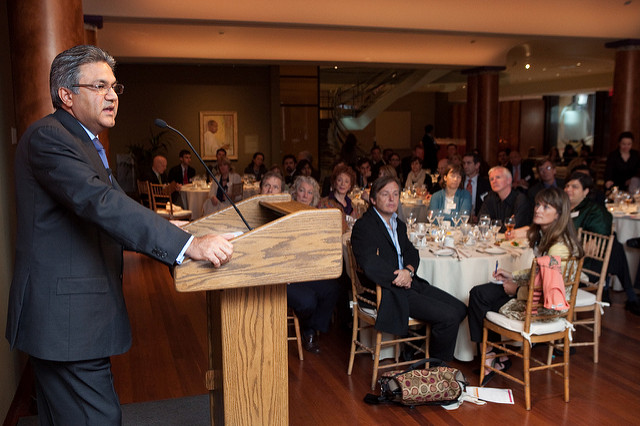
Acumen_ – Keynote Speech – CC BY-NC-ND 2.0.
The last type of special occasion speech we will examine is the keynote speech. A keynote speech is delivered to set the underlying tone and summarize the core message of an event. People who deliver keynote speeches are typically experts in a given area who are invited to speak at a conference, convention, banquet, meeting, or other kinds of events with the purpose of setting a specific tone for the occasion. As mentioned, keynote speeches often are meant to inspire an audience. This inspiration can anything from motivating staff at a sales convention to discussing organizational values and imparting wisdom on a group with a shared goal or purpose.
Some keynote speakers will work for a speakers bureau, an agency that represents celebrity and professional speakers. One important organization for all aspiring keynote speakers is the National Speaker’s Association, or NSA. ( http://www.nsaspeaker.org ). In the world of professional public speaking, there are two common types of keynotes: after-dinner speeches and motivational speeches. Let’s look at each of these unique speeches.
After-Dinner Speeches
Ironically, an after-dinner speech does not have to occur after a formal dinner, though it does get its name from the idea that these speeches historically followed a meal of some kind. After-dinner speakers are generally asked (or hired) to speak because they have the ability both to effectively convey a message and to make people laugh. This characteristic does not mean its only goal is to entertain. The after-dinner speech could serve any of the functions previously detailed in this chapter, and all the basic conventions of public speaking discussed in this text apply to after-dinner speeches. However, the overarching goal of these speeches is to entertain and create a light-hearted, jovial atmosphere.
After-dinner speaking is a challenging type of speaking because it requires a balance of entertainment and humor by providing substantive insight into the topic of the event or situation. Finding this balance will allow speakers to deliver a rewarding speech that leaves a lasting impact on the audience. For an example of an after-dinner speech, read the following speech delivered by Mark Twain on his seventieth birthday: ( https://www.pbs.org/marktwain/learnmore/writings_seventieth.html ).
Here are some things to consider when preparing an after-dinner speech.
First, use all that you have learned about informative or persuasive speeches to prepare for this speech, and then consider the four items of note we will outline later in this chapter for creating a successful special occasion speech. You must prepare, consider the occasion, understand your audience, and be mindful of time constraints surrounding your speech and the event.
Second, remember that this is not an opportunity to try your hand at stand-up comedy. The after-dinner speech has a specific goal or purpose, which you must identify and attempt to accomplish. Doing so requires that your speech has a recognizable structure like your more formal speeches: an introduction, a body, and a conclusion. While you ideally want to entertain and amuse your audience, you also want to be sure you achieve your speech goal in the given timeframe.
Motivational Speaking
The second common form of keynote speaking is motivational speaking. A motivational speech is designed not only to make an audience experience emotional arousal (fear, sadness, joy, excitement) but also to motivate the audience to do something with that emotional arousal. Whereas a traditional persuasive speech may attempt to influence listeners to purchase a product or agree with an ideology, a motivational speech helps to inspire people in a broader fashion, often without a clearly articulated end result in mind. As such, motivational speaking is a highly specialized form of persuasive speaking commonly delivered in schools, businesses, or religious, club, and group contexts. The Toastmasters International Guide to Successful Speaking lists four types of motivational speeches: hero, survivor, religious, and success (Slutsky & Aun, 1997).
The hero speech is a motivational speech given by someone who is considered a hero in society (e.g. military speakers, political figures, and professional athletes). Just type “motivational speech” into YouTube and you’ll find many motivational speeches given by individuals who can be considered heroes or role models. The following clip ( https://www.youtube.com/watch?v=vMlmbz8-_Xg ) presents a speech by Steve Sax, a former major league baseball player.
In this speech, Sax talks about his life as a baseball player, along with issues related to leadership, overcoming obstacles, and motivation.
The survivor speech is a speech given by someone who has survived a personal tragedy or who has faced and overcome serious adversity. In the following clip ( https://www.youtube.com/watch?v=NasfjwL8wTc ), Becky Olson discusses her life as a cancer survivor.
Becky Olson goes all over the country talking with and motivating cancer survivors to beat the odds.
The final type of motivational speech is the success speech, which is given by someone who has succeeded in some aspect of life and is giving back by telling others how they too can be successful. In the following clip ( https://www.youtube.com/watch?v=E52eIa1VSgQ ), the then CEO of Xerox, Anne Mulcahy, speaks before a group of students at the University of Virginia discussing the spirit of entrepreneurship.
https://www.youtube.com/watch?v=E52eIa1VSgQ
In this speech, Mulcahy shares the leadership lessons she had learned as the CEO of Xerox
Review of the Types of Special Occasion Speeches
A speech of introduction is a short speech that introduces another speaker.
A speech of presentation is a brief speech given to accompany a prize or honor.
The speech of acceptance is a speech given by the recipient of a prize or honor.
A speech of dedication is delivered when a new store opens, a building is named after someone, a plaque is placed on a wall, a new library is completed, and so on. These speeches are designed to highlight the importance of the project and those to whom the project has been dedicated.
A toast is a speech designed to congratulate, appreciate, or remember.
A roast speech is designed to both praise and good-naturedly poke fun at a person being honored.
A eulogy is a speech given in honor of someone who has died.
A s peech of farewell allows someone to say goodbye to one part of their life as they move on to the next part of life.
An inspirational speech elicits an emotional state within an audience. Inspirational speeches include speeches to ensure goodwill and commencement addresses.
A keynote speech is delivered to set the underlying tone and summarize the core message of an event. Keynote speeches include after-dinner and motivational speeches.
Delivering Your Special Occasion Speech
Special occasion speeches may be common, but that doesn’t mean they don’t require effort and preparation. A frequent trap is that people often do not consider the impact these speeches can have on the occasion. For instance, a wedding toast not only leaves a lasting impression on the couple getting married but also all of the guests in attendance (not to mention it will likely be recorded and posted on social media). As a result, one may not prepare seriously but instead, stand up to speak with the idea that they can “wing it” by acting silly and telling a few jokes. Rather than being entertaining or commemorating the occasion, the speech appears ill-prepared and falls flat. To help us think through how to be effective in delivering special occasion speeches, let’s look at four key items to remember: preparation, adaptation to the occasion, adaptation to the audience, and mindfulness about the time.
First, and foremost, the biggest mistake you can make when standing to deliver a ceremonial speech is to be underprepared or simply not prepare at all. We’ve stressed the need for preparation throughout this text, so just because you’re giving a wedding toast or a eulogy doesn’t mean you shouldn’t think through the speech before you stand up and speak out. If the situation is impromptu, even jotting some basic notes on a napkin is better than not having any plan for what you are going to say. Remember, when you get anxious, as inevitably happens in front of an audience, your brain doesn’t function as well as when you are having a relaxed conversation with friends. You often forget information. By writing down some simple notes, you’ll be poised to deliver a more thoughtful speech that matches the needs of the occasion.
Consider the Occasion
Not all content is appropriate for all occasions. If you are asked to deliver a speech commemorating the first anniversary of a school shooting, then obviously using humor and telling jokes is not appropriate. But some decisions about adapting to the occasion are less obvious. Consider the following examples:
- You are the maid of honor giving a toast at the wedding of your younger sister.
- You are receiving a Most Valuable Player award in your favorite sport.
- You are a sales representative speaking to a group of clients after a mistake has been discovered.
- You are a cancer survivor speaking at a high school student assembly.
How might you adapt your message and speaking style to successfully mark each occasion in front of the various audiences in attendance? Remember that being a competent speaker is about being both personally effective and socially appropriate. Different occasions will call for different speech functions. As a speaker, it is important to understand the needs of the occasion and adapt your content accordingly. One of the biggest mistakes speakers can make is to deliver one generic speech to different groups without adapting the speech to the specific occasion. In fact, professional speakers always make sure that their speeches are tailored to each specific occasion by asking questions and investigating the details of each event or situation. When we customize our speech for the special occasion, people are more likely to remember the speech than if we give a generic speech.
Consider Your Audience
Understanding your audience remains one of the most critical aspects of preparing your speech for any occasion. Different audiences will respond differently to speech material. The more you know about your audience and the more you are able to adapt your content to their needs and wants, the more likely your speech will have an impact and you will effectively achieve your speaking goal. One of the coauthors of this text was at a conference specifically for teachers of public speaking. The keynote speaker stood and delivered a speech on the importance of public speaking. Remember, a function of keynote speaking is to inspire the audience. Though this particular speaking was highly informed on the topic and even entertained the audience, the speech did not go over very well with the audience. Why do you think this was? Speaking to an audience of public speaking instructors, a safe assumption is that they already believe in the importance of the subject. Thus, we can also assume that the speaker may not have considered the audience when preparing the speech, and therefore it is likely the keynote did not fulfill its function of inspiring them.
Be Mindful of the Time
There are very few times in life, whether it be academic, professional, or personal, that you will be given an infinite amount of time to do anything. This is an important consideration to keep in mind when preparing your special occasion speech (as well as your informative and persuasive speeches!). Special occasions often consist of more than just speeches. Each has its own conventions and rules with regard to time. Acceptance speeches and toasts, for example, should be relatively short (typically under five minutes). A speech of introduction should be extremely brief, just long enough to tell the audience what they need to know about the person being introduced and prepares them to appreciate that person’s remarks. Conversely, commemorative speeches, commencement speeches, and keynote addresses tend to be longer as they include more content and have different goals.
When it comes to speech timing, the other three items we’ve discussed in this section can come in very handy. With preparation and practice, you can ensure your speech adheres to a specific timeframe. Considering your occasion and understanding your audience will also help you when crafting your speech and determining an appropriate amount of time for speaking. Think about a wedding you’ve attended when a toast honoring the couple has gone on and on and on, and everyone, including the happy couple, just wanted to get up and dance. There are also examples of instances when an audience may have been eager to be inspired and motivated but left disappointed when the speaker presented a quick and vapid speech. It can go either way, and that’s why it is important to be prepared, consider the occasion, and understand your audience.
It is also perfectly acceptable to ask questions about the expected time frame for a speech. Either ask the person who has invited you to speak, or you can do some quick research to see what the average speech times in the given context tend to be.
Slutsky, J., & Aun, M. (1997). The Toastmasters International® guide to successful speaking: Overcoming your fears, winning over your audience, building your business & career. Chicago, IL: Dearborn Financial Publishing.
Stand up, Speak out Copyright © 2017 by Josh Miller; Marnie Lawler-Mcdonough; Megan Orcholski; Kristin Woodward; Lisa Roth; and Emily Mueller is licensed under a Creative Commons Attribution-NonCommercial-ShareAlike 4.0 International License , except where otherwise noted.
Share This Book
- Games, topic printables & more
- The 4 main speech types
- Example speeches
- Commemorative
- Declamation
- Demonstration
- Informative
- Introduction
- Student Council
- Speech topics
- Poems to read aloud
- How to write a speech
- Using props/visual aids
- Acute anxiety help
- Breathing exercises
- Letting go - free e-course
- Using self-hypnosis
- Delivery overview
- 4 modes of delivery
- How to make cue cards
- How to read a speech
- 9 vocal aspects
- Vocal variety
- Diction/articulation
- Pronunciation
- Speaking rate
- How to use pauses
- Eye contact
- Body language
- Voice image
- Voice health
- Public speaking activities and games
- About me/contact
- Types of speeches
The 4 types of speeches
Informative, demonstrative, persuasive and special occasion.
By: Susan Dugdale | Last modified: 01-31-2024
There are four main types of speeches or types of public speaking.
- Demonstrative
- Special occasion or Entertaining
To harness their power a speaker needs to be proficient in all of them: to understand which speech type to use when, and how to use it for maximum effectiveness.
What's on this page:
An overview of each speech type, how it's used, writing guidelines and speech examples:
- informative
- demonstrative
- special occasion/entertaining
- how, and why, speech types overlap

Return to Top
Informative speeches
An informative speech does as its name suggests: informs. It provides information about a topic. The topic could be a place, a person, an animal, a plant, an object, an event, or a process.
The informative speech is primarily explanatory and educational.
Its purpose is not to persuade or influence opinion one way or the other. It is to provide sufficient relevant material, (with references to verifiable facts, accounts, studies and/or statistics), for the audience to have learned something.
What they think, feel, or do about the information after they've learned it, is up to them.
This type of speech is frequently used for giving reports, lectures and, sometimes for training purposes.
Examples of informative speech topics:
- the number, price and type of dwellings that have sold in a particular suburb over the last 3 months
- the history of the tooth brush
- how trees improves air quality in urban areas
- a brief biography of Bob Dylan
- the main characteristics of Maine Coon cats
- the 1945 US bombing of Hiroshima and Nagasaki
- the number of, and the work of local philanthropic institutions
- the weather over the summer months
- the history of companion planting
- how to set up a new password
- how to work a washing machine

Click this link if you'd like more informative topic suggestions . You'll find hundreds of them.
And this link to find out more about the 4 types of informative speeches : definition, description, demonstration and explanation. (Each with an example outline and topic suggestions.)
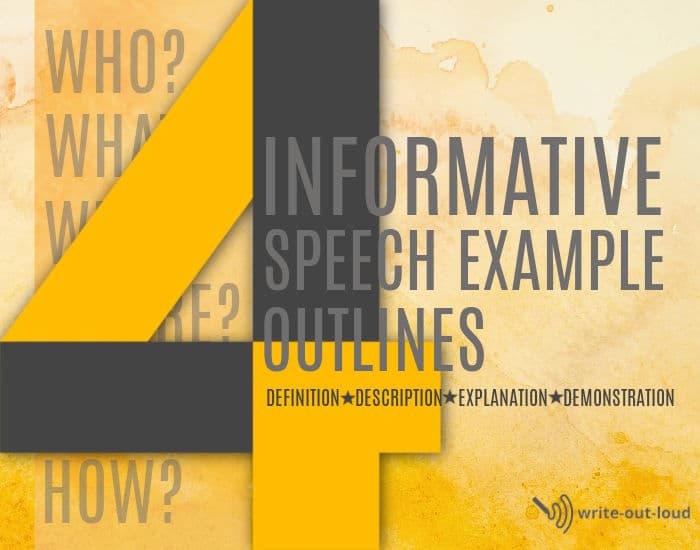
Demonstration, demonstrative or 'how to' speeches
A demonstration speech is an extension of an informative process speech. It's a 'how to' speech, combining informing with demonstrating.
The topic process, (what the speech is about), could either be demonstrated live or shown using visual aids.
The goal of a demonstrative speech is to teach a complete process step by step.
It's found everywhere, all over the world: in corporate and vocational training rooms, school classrooms, university lecture theatres, homes, cafes... anywhere where people are either refreshing or updating their skills. Or learning new ones.
Knowing to how give a good demonstration or 'how to' speech is a very valuable skill to have, one appreciated by everybody.
Examples of 'how to' speech topics are:
- how to braid long hair
- how to change a car tire
- how to fold table napkins
- how to use the Heimlich maneuver
- how to apply for a Federal grant
- how to fill out a voting form
- how to deal with customer complaints
- how to close a sale
- how to give medicine to your cat without being scratched to bits!
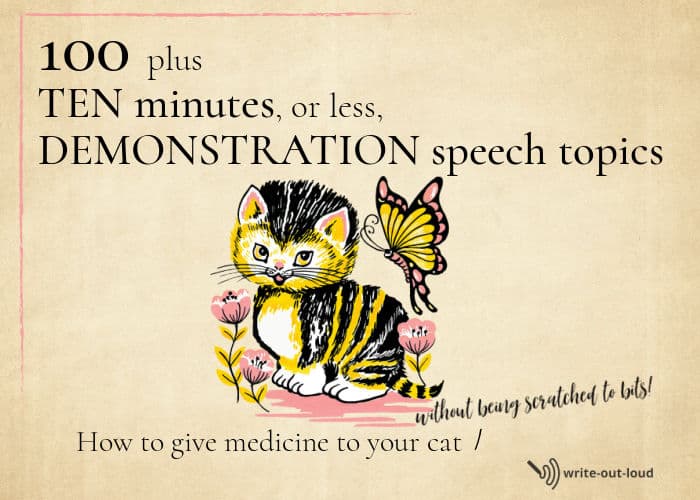
Resources for demonstration speeches
1 . How to write a demonstration speech Guidelines and suggestions covering:
- choosing the best topic : one aligning with your own interests, the audience's, the setting for the speech and the time available to you
- how to plan, prepare and deliver your speech - step by step guidelines for sequencing and organizing your material plus a printable blank demonstration speech outline for you to download and complete
- suggestions to help with delivery and rehearsal . Demonstration speeches can so easily lurch sideways into embarrassment. For example: forgetting a step while demonstrating a cake recipe which means it won't turn out as you want it to. Or not checking you've got everything you need to deliver your speech at the venue and finding out too late, the very public and hard way, that the lead on your laptop will not reach the only available wall socket. Result. You cannot show your images.
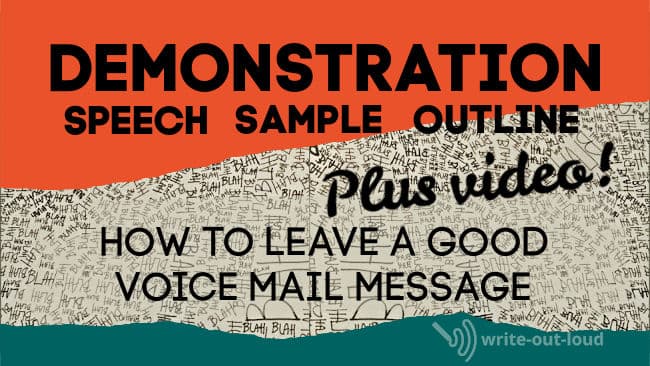
2. Demonstration speech sample outline This is a fully completed outline of a demonstration speech. The topic is 'how to leave an effective voice mail message' and the sample covers the entire step by step sequence needed to do that.
There's a blank printable version of the outline template to download if you wish and a YouTube link to a recording of the speech.
3. Demonstration speech topics 4 pages of 'how to' speech topic suggestions, all of them suitable for middle school and up.

Persuasive speeches
The goal of a persuasive speech is to convince an audience to accept, or at the very least listen to and consider, the speaker's point of view.
To be successful the speaker must skillfully blend information about the topic, their opinion, reasons to support it and their desired course of action, with an understanding of how best to reach their audience.
Everyday examples of persuasive speeches
Common usages of persuasive speeches are:
- what we say when being interviewed for a job
- presenting a sales pitch to a customer
- political speeches - politicians lobbying for votes,
- values or issue driven speeches e.g., a call to boycott a product on particular grounds, a call to support varying human rights issues: the right to have an abortion, the right to vote, the right to breathe clean air, the right to have access to affordable housing and, so on.
Models of the persuasive process
The most frequently cited model we have for effective persuasion is thousands of years old. Aristotle, the Greek philosopher, 384–322 BC , explained it as being supported by three pillars: ethos, pathos and logos.
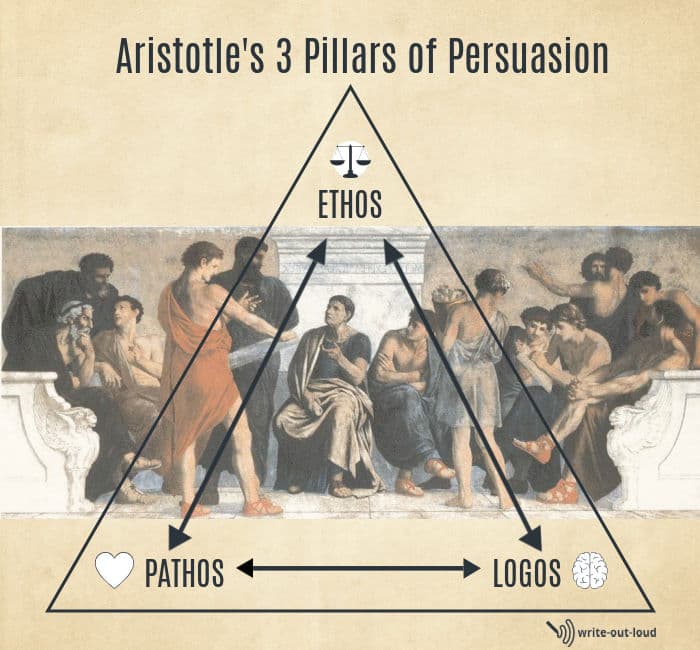
Briefly, ethos is the reliability and credibility of the speaker. How qualified or experienced are they talk on the topic? Are they trustworthy? Should we believe them? Why?
Pathos is the passion, emotion or feeling you, the speaker, bring to the topic. It's the choice of language you use to trigger an emotional connection linking yourself, your topic and the audience together, in a way that supports your speech purpose.
(We see the echo of Pathos in words like empathy: the ability to understand and share the feels of another, or pathetic: to arouse feelings of pity through being vulnerable and sad.)
Logos is related to logic. Is the information we are being presented logical and rational? Is it verifiable? How is it supported? By studies, by articles, by endorsement from suitably qualified and recognized people?
To successfully persuade all three are needed. For more please see this excellent article: Ethos, Pathos, Logos: 3 Pillars of Public Speaking and Persuasion
Monroe's Motivated Sequence of persuasion
Another much more recent model is Monroe's Motivated Sequence based on the psychology of persuasion.

It consists of five consecutive steps: attention, need, satisfaction, visualization and action and was developed in the 1930s by American Alan H Monroe, a lecturer in communications at Purdue University. The pattern is used extensively in advertising, social welfare and health campaigns.
Resources for persuasive speeches
1. How to write a persuasive speech Step by step guidelines covering:
- speech topic selection
- setting speech goals
- audience analysis
- empathy and evidence
- balance and obstacles
- 4 structural patterns to choose from
2. A persuasive speech sample outline using Monroe's Motivated Sequence
3. An example persuasive speech written using Monroe's Motivated Sequence
4. Persuasive speech topics : 1032+ topic suggestions which includes 105 fun persuasive ideas , like the one below.☺

Special occasion or entertaining speeches
The range of these speeches is vast: from a call 'to say a few words' to delivering a lengthy formal address.
This is the territory where speeches to mark farewells, thanksgiving, awards, birthdays, Christmas, weddings, engagements and anniversaries dwell, along with welcome, introduction and thank you speeches, tributes, eulogies and commencement addresses.
In short, any speech, either impromptu or painstakingly crafted, given to acknowledge a person, an achievement, or an event belongs here.
You'll find preparation guidelines, as well as examples of many special occasion speeches on my site.
Resources for special occasion speeches
How to prepare:
- an acceptance speech , with an example acceptance speech
- a birthday speech , with ongoing links to example 18th, 40th and 50th birthday speeches
- an office party Christmas speech , a template with an example speech
- an engagement party toast , with 5 examples
- a eulogy or funeral speech , with a printable eulogy planner and access to 70+ eulogy examples
- a farewell speech , with an example (a farewell speech to colleagues)
- a golden (50th) wedding anniversary speech , with an example speech from a husband to his wife
- an impromptu speech , techniques and templates for impromptu speaking, examples of one minute impromptu speeches with a printable outline planner, plus impromptu speech topics for practice
- an introduction speech for a guest speaker , with an example
- an introduction speech for yourself , with an example
- a maid of honor speech for your sister , a template, with an example
- a retirement speech , with an example from a teacher leaving to her students and colleagues
- a student council speech , a template, with an example student council president, secretary and treasurer speech
- a Thanksgiving speech , a template, with an example toast
- a thank you speech , a template, with an example speech expressing thanks for an award, also a business thank you speech template
- a tribute (commemorative) speech , with a template and an example speech
- a welcome speech for an event , a template, an example welcome speech for a conference, plus a printable welcome speech planner
- a welcome speech for new comers to a church , a template with an example speech
- a welcome speech for a new member to the family , a template with an example
Speech types often overlap
Because speakers and their speeches are unique, (different content, purposes, and audiences...), the four types often overlap. While a speech is generally based on one principal type it might also have a few of the features belonging to any of the others.
For example, a speech may be mainly informative but to add interest, the speaker has used elements like a demonstration of some sort, persuasive language and the brand of familiar humor common in a special occasion speech where everybody knows each other well.
The result is an informative 'plus' type of speech. A hybrid! It's a speech that could easily be given by a long serving in-house company trainer to introduce and explain a new work process to employees.
Related pages:
- how to write a good speech . This is a thorough step by step walk through, with examples, of the general speech writing process. It's a great place to start if you're new to writing speeches. You'll get an excellent foundation to build on.
- how to plan a speech - an overview of ALL the things that need to be considered before preparing an outline, with examples
- how to outline a speech - an overview, with examples, showing how to structure a speech, with a free printable blank speech outline template to download
- how to make and use cue cards - note cards for extemporaneous speeches
- how to use props (visual aids)
And for those who would like their speeches written for them:
- commission me to write for you
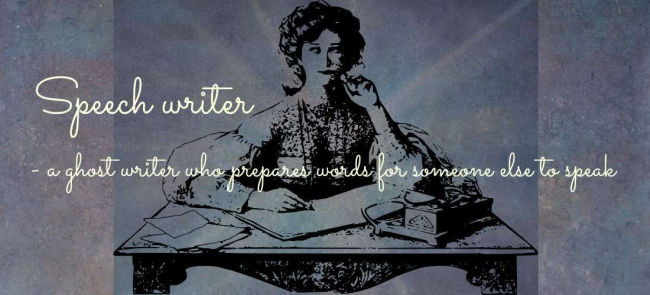
speaking out loud
Subscribe for FREE weekly alerts about what's new For more see speaking out loud

Top 10 popular pages
- Welcome speech
- Demonstration speech topics
- Impromptu speech topic cards
- Thank you quotes
- Impromptu public speaking topics
- Farewell speeches
- Phrases for welcome speeches
- Student council speeches
- Free sample eulogies
From fear to fun in 28 ways
A complete one stop resource to scuttle fear in the best of all possible ways - with laughter.

Useful pages
- Search this site
- About me & Contact
- Blogging Aloud
- Free e-course
- Privacy policy
©Copyright 2006-24 www.write-out-loud.com
Designed and built by Clickstream Designs

Farewell Speech – How to Write and Deliver Farewell Speech

Table of Contents
Introduction
Fill Out the Form for Expert Academic Guidance!
Please indicate your interest Live Classes Books Test Series Self Learning
Verify OTP Code (required)
I agree to the terms and conditions and privacy policy .
Fill complete details
Target Exam ---
A fare well speech is a way to say good bye to your colleagues, students, teachers before leaving an organization, school or a college. It is a way to show your respect and gratitude for your colleagues and friends before the final departure. A fare well speech is like a more sophisticated, formal and glorified version of ‘Good Bye’. It is a narration of experiences gained together, moments those were spent together or achievements made.
A fare well speech is usually given by the colleagues to a leaving or retiring employee or to the teachers, students leaving an institution. It may also be given by the colleagues, students to any leaving employee or student. It give the departing employee an opportunity to personally acknowledge and thanks his/her colleagues or the vice versa.
Farewell Speech
By going though this article you will be able to know about What is a Farewell, How to Write an Effective Fare Well speech, How to Start a Farewell Speech, How to be Prepared and have Much Confidence, Characteristics of a Gracious Farewell Speech, Types of Farewell Speeches and How to Start them.
What is a Farewell?
A farewell is an event organized to felicitate and honor a leaving colleague, student or teacher, to show him/her that how much they mattered in the organization and that they will be missed by all. It is an event which is equally important for the departing employee as well as for his/her colleagues who remained.
If you are an employee leaving an organization, or a student changing college or a teacher moving on to new phase of life, I have explained below how to write and effective and touching fare well speech for your colleagues and friends.
How to Write an Effective Farewell speech? (How to Start a Farewell Speech)
A fare well speech might be serving a variety of audiences like- colleagues, family, friends etc. You should be able to understand the need and sentiments of your audiences, which should form the basis of your speech. Either the speech is by a leaving person or for the leaving person; in both the cases it must have a definite structure and should convey a positive message. An effective fare well speech can be broken up in three parts- introduction, main body and conclusion. Below an explanation for how to write an effective farewell speech is given to help you prepare speech for your own fare well or the farewell of a dear friend, colleague, teacher or a co student. After going through the content you will be able to write an effective fare well speech and earn accolades by your colleagues and friends-
I – Introduction
The Introduction of a Fare Well speech can be divided into two parts as described below-
Part 1 (Greeting the Audience)
The introduction part of a farewell speech includes greeting the audiences and informing them about the occasion. The speaker should have knowledge of the audience that he is addressing, and must greet them accordingly. Common greetings include- Dear all, dear friends, respected ladies and gentlemen etc. The dignitaries or distinct individuals present should be greeted individually. Like- Respected Principal, Respected Vice President sir etc. The groups in the audience’s like- students, colleagues, friends and co workers should be greeted collectively, keeping in mind their sentiments. Some of the most common greeting methods of groups are- my dear/loving friends, dear/loving colleagues, dear co workers etc. The above rule remains the same irrespective of whether the speech is made by the leaving person or for the leaving person.
Part 2 (Informing about the occasion)
Post the greetings, the speaker should inform the audience about the purpose of the event i.e. why they have gathered. Informing the audience that Mr. Z (imaginary name) is leaving the organization and moving onto a new chapter of life, for a better future and we are gathered here to say a final good bye to him/her.
If the leaver himself is giving the speech then he must inform the audience about his decision to leave and though the decision is hard, he or she has to take it and should also convey his or her grief or sorrow of having to depart from the audience.
II Main Body of the Speech
This is indeed the most important part of any fare well speech. It is here that you deliver your message to the audience and share experiences. At this point we must decide whether the speech is by a leaver addressing his colleagues, or it is by one of his colleagues addressed to him. Below we will go through how to form an effective and impressive main body of the speech.
If the farewell speech has to be given by a leaver or his colleague, it must include the following in the same sequence-
1) True and Factual
Any speech for that matter is effective only when it sounds true, relevant and based on facts and real experiences.
2) Positivity
This is the most important trait of a farewell speech; it must reflect positivity.
3) How long have you/they been?
If you are the leaver than you must inform the audiences about how long have you been in the organization, and if you are giving speech for the leaver then tell the audience about his/her total tenure in the organization. Like- since 2015 etc.
4) Sharing Admirations and Achievements
An effective farewell speech must include achievements made by the leaver, in case if the speaker is one of his colleagues. In case the leaver himself is giving speech then he must admire his colleagues and the organization and thank them for the achievements he had made under their guidance and supervision.
5) Conveying the experiences
A leaver/colleague must convey to the audiences that his/her experience with the other colleagues/leaver had been wonderful and unforgettable, and he/she is going to cherish those memories for life.
6) Personal Experiences/Acknowledgements
The speaker may take the opportunity to share his/her personal experiences with a colleague or the leaver and how encouraging or supporting, they have been. Sharing such experiences is like publicly acknowledging them and thanking them for what they have done resulting in a more stronger and emotional bonding.
7) Add some humor
If you had some humorous experience of sorts during your office tenure or in college, you can take the opportunity to lighten up the mood. Either the leaver or his colleague could narrate such funny but real experiences, depending on who is giving the speech. A leaver can share his experience with anyone in the organization while a colleague must always share incidents those involve the leaver.
III Conclusion
The conclusion part of the speech should be brief and once again thank everyone present, for taking out their precious time for the occasion. This part must express gratitude to the colleagues those the leaver is going to depart from, or to the leaver who is leaving the organization. In both the cases it must convey that the loss is regretted but the memories will be cherished for life.

How to be Prepared and have Much Confidence?
The following points must be stressed upon in order to prepare oneself for a farewell speech. They include some effective ways to deliver your prepared farewell speech. After going through it you will know how to prepare for an effective Fare well speech as well as how to have much confidence-
- Know the event well in advance.
- Know and understand the audiences.
- Know the purpose of the event.
- Interact with colleagues, seniors to know more about the leaving person.
- Summarize his experiences, achievements and capacities.
- Prepare an effective fare well speech as explained above.
- Make the speech concise and compact by removing unnecessary sentences.
- Rehearse the speech in a loud voice, better if in front of a mirror.
- Rehearse using appropriate gestures as you would do in actual speech.
- Ask your parents or friends to be the audience and rehearse in front of them.
- Ask them to give feedback and improve your weak points.
- Arrive early to the event.
- Make yourself comfortable with the surroundings.
- Socialize and speak your heart out before the speech.
- Put more emphasis on your facial expressions i.e. smile only when it’s required.
- Feel confident or at least pretend to be confident even if you are nervous. Nobody can guess unless you show your nervousness.
- Make direct eye contact with your audience.
- Add some last moment incident or a joke if it fits well.
- Don’t fight your fear, just ignore it. Fighting is a waste of time.
If you are getting nervous then going through the following lines will sure boost up your confidence-
- Even experienced speakers get nervous at some point of time.
- They don’t know it, so don’t show it.
- Audience is listening to you, not judging you.
Nervousness has a habit of revealing itself through the following-
1) Through your eyes
Avoiding direct eye contact with the audiences shows that you are nervous. So, don’t hesitate to make direct eye contact.
2) Through facial gestures
Avoid unnecessary facial gestures, especially smiles. Smiling without reason is an indication of your nervousness. Smile only when necessary.
3) Through Unwanted Hand Gestures
Avoid unnecessary gestures and use only appropriate hand gestures.
Now that we know how to write an effective fare well speech and also how to deliver and develop confidence, below we will go through on how to start a fare well speech for different occasions.
Characteristics of a Gracious Farewell Speech
A gracious fare well speech must have following characteristics.
1) Based on truth
2) Positive and confident
3) Convey regards and thanks
4) Appreciations and achievements
5) A little humor
6) Underestimates no one
7) Rightly timed
8) Appropriate hand and facial gestures
9) Sharing good and happy experiences
10) Narrating qualities and achievements
11) Acknowledging friends and colleagues
12) Thanking the audience present
How to Start a Farewell Speech?
Good farewell speech is started by an introduction of yourself and greets your audience and tells them the objective of the event and the speech. The first greeting words of the speech are delivered showing respect and gratitude for the audiences present followed by an introduction of the event.

Types of Farewell Speeches and How to Start them
There may be various occasions like an employee leaving an organization, student leaving a college or a teacher leaving school, that call for a farewell speech. The format of beginning a fare well speech remains unchanged either the speech is delivered by the leaver or it is delivered for the leaver. In both the cases the fare well speech is basically a thanks giving speech.
1) For a Leaving Employee
By the leaving employee himself
A leaving employee of an organization has to address his colleagues, subordinates, friends and seniors in a fare well speech. Therefore he/she has to greet everyone in the speech’s introductory paragraph. The various ways of greetings that could be made on this occasion are give below-
- My dear colleagues and Respected Seniors, a warm welcome to you all.
- My dear friends, colleagues and respected seniors, you are most welcome to this occasion.
- My dear friends, colleagues, Respected Seniors and all the management team, accept my greetings.
- Good evening ladies and gentlemen.
In a formal fare well speech even the subordinates are referred to as ‘Dear colleagues’ or ‘dear friends’ to show one’s gratitude and respect towards them. Even the person from higher managerial level is supposed to use ‘dear friends’, ‘dear colleagues’ , for his subordinates in a fair well speech.
By the Colleagues
If you are giving a farewell speech for one of your colleagues, seniors of other employees, you can start your fare well speech in the way as described below-
- Respected Seniors, my dear colleagues and friends, we are here to say good bye to dear Mr. X (imaginary name)
- Respected ladies and gentlemen as we all know that we have gathered today, for the farewell of dear Mr. Y, who is leaving us for his new endeavors.
In the same manner there could be another generous formation to begin the speech.
2) For a Student
By the Student himself
Any student leaving a school or moving out of a college has to address his friends, juniors, teachers, principal, dean and the office staff or the management staff. In the introduction of his fare well speech a student must address all those mentioned above and show his gratitude towards them. The various ways in which they could be greeted is given below-
- Respected Principal Sir and teachers, my dear friends, loving juniors and all the office staff, I take the opportunity to thank.
- Respected Dean Sir, Principal Sir, Respected teacher, dear friends, loving juniors and the office staff, accept my hearty greetings on the occasion.
Kindly note in the introduction of a fare well speech given by a leaving student, it’s ok to refer to your juniors as ‘dear juniors’ also they can be referred to as ‘dear friend’ depending on the discretion of the speaker.
By his/her Co-Students or Teachers
Students or teachers giving farewell speech for a leaving departing student may begin the speech as below-
- My dear friends and respected teachers, we all have gathered here to say good bye to my dear friend and an ideal student , Mr. Punit (imaginary name)
- Respected Principal Sir and my dear friends we all gathered here for the farewell of one of my favorite students, Mr. Punit (imaginary name)
3) For a Teacher
By The Leaving Teacher himself
A teacher’s introductory fare well speech must compliment his colleagues, principal students and other staff. The basic starting format for a departing teacher is as given below-
- Respected Principal Sir, my dear colleagues, loving students and all the office staff.
- Respected Dean Sir, Principal Sir, my dear colleagues and all the office staff, I take this opportunity to thank you all.
The greeting should be followed by the phrases like-
- Kindly accept my greetings.
- I welcome you all on this occasion.
- It’s an honor to speak about my experiences.
- I would like to thank you all for your cooperation and encouragement.
- Thank you for providing this opportunity to share my experiences and show my love and respect.
You may choose your own introductory sentences depending on the occasion, using your own discretion.
By his Colleagues and Students
Students or teachers giving farewell speech for a leaving teacher, may begin the speech as below-
- My dear friends and respected teachers, we all have gathered here to say good bye to one of my favorite teachers , Mr. Punit (imaginary name)
- Respected Principal Sir and my dear students, we all gathered here for the farewell of one of my favorite colleagues and a great teacher, Mr. Punit (imaginary name)
At the end of this article you are ready to write an effective farewell speech and deliver it with confidence to earn appreciation from your colleagues, friends, seniors, teachers etc.
A farewell speech has to ignite the sorrow of separation along with the joy of being together. It should share the experiences, the fun and the achievements, made together. A good speech makes the event memorable for the audience, the speaker and also the leaver, for whom the speech is being delivered. I hope that after going through the article you would be able to write, practice and deliver an effective Farewell speech.
List of Related Speech Topics
Related content
Talk to our academic expert!
Language --- English Hindi Marathi Tamil Telugu Malayalam
Get access to free Mock Test and Master Class
Register to Get Free Mock Test and Study Material
Offer Ends in 5:00
Farewell Address to the Nation
January 11, 1989
My fellow Americans:
This is the 34th time I'll speak to you from the Oval Office and the last. We've been together 8 years now, and soon it'll be time for me to go. But before I do, I wanted to share some thoughts, some of which I've been saving for a long time.
It's been the honor of my life to be your President. So many of you have written the past few weeks to say thanks, but I could say as much to you. Nancy and I are grateful for the opportunity you gave us to serve.
One of the things about the Presidency is that you're always somewhat apart. You spend a lot of time going by too fast in a car someone else is driving, and seeing the people through tinted glass -- the parents holding up a child, and the wave you saw too late and couldn't return. And so many times I wanted to stop and reach out from behind the glass, and connect. Well, maybe I can do a little of that tonight.
People ask how I feel about leaving. And the fact is, ``parting is such sweet sorrow.'' The sweet part is California and the ranch and freedom. The sorrow -- the goodbyes, of course, and leaving this beautiful place.
You know, down the hall and up the stairs from this office is the part of the White House where the President and his family live. There are a few favorite windows I have up there that I like to stand and look out of early in the morning. The view is over the grounds here to the Washington Monument, and then the Mall and the Jefferson Memorial. But on mornings when the humidity is low, you can see past the Jefferson to the river, the Potomac , and the Virginia shore. Someone said that's the view Lincoln had when he saw the smoke rising from the Battle of Bull Run. I see more prosaic things: the grass on the banks, the morning traffic as people make their way to work, now and then a sailboat on the river.
I've been thinking a bit at that window. I've been reflecting on what the past 8 years have meant and mean. And the image that comes to mind like a refrain is a nautical one -- a small story about a big ship, and a refugee, and a sailor. It was back in the early eighties, at the height of the boat people. And the sailor was hard at work on the carrier Midway, which was patrolling the South China Sea . The sailor, like most American servicemen, was young, smart, and fiercely observant. The crew spied on the horizon a leaky little boat. And crammed inside were refugees from Indochina hoping to get to America . The Midway sent a small launch to bring them to the ship and safety. As the refugees made their way through the choppy seas, one spied the sailor on deck, and stood up, and called out to him. He yelled, ``Hello, American sailor. Hello, freedom man.''
A small moment with a big meaning, a moment the sailor, who wrote it in a letter, couldn't get out of his mind. And, when I saw it, neither could I. Because that's what it was to be an American in the 1980's. We stood, again, for freedom. I know we always have, but in the past few years the world again -- and in a way, we ourselves -- rediscovered it.
It's been quite a journey this decade, and we held together through some stormy seas. And at the end, together, we are reaching our destination.
The fact is, from Grenada to the Washington and Moscow summits, from the recession of '81 to '82, to the expansion that began in late '82 and continues to this day, we've made a difference. The way I see it, there were two great triumphs, two things that I'm proudest of. One is the economic recovery, in which the people of America created -- and filled -- 19 million new jobs. The other is the recovery of our morale. America is respected again in the world and looked to for leadership.
Something that happened to me a few years ago reflects some of this. It was back in 1981, and I was attending my first big economic summit, which was held that year in Canada. The meeting place rotates among the member countries. The opening meeting was a formal dinner for the heads of government of the seven industrialized nations. Now, I sat there like the new kid in school and listened, and it was all Francois this and Helmut that. They dropped titles and spoke to one another on a first-name basis. Well, at one point I sort of leaned in and said, `` My name's Ron.'' Well, in that same year, we began the actions we felt would ignite an economic comeback -- cut taxes and regulation, started to cut spending. And soon the recovery began.
Two years later, another economic summit with pretty much the same cast. At the big opening meeting we all got together, and all of a sudden, just for a moment, I saw that everyone was just sitting there looking at me. And then one of them broke the silence. ``Tell us about the American miracle,'' he said.
Well, back in 1980, when I was running for President, it was all so different. Some pundits said our programs would result in catastrophe. Our views on foreign affairs would cause war. Our plans for the economy would cause inflation to soar and bring about economic collapse. I even remember one highly respected economist saying, back in 1982, that `` The engines of economic growth have shut down here, and they're likely to stay that way for years to come.'' Well, he and the other opinion leaders were wrong. The fact is, what they called ``radical'' was really ``right.'' What they called ``dangerous'' was just ``desperately needed.''
And in all of that time I won a nickname, ``The Great Communicator.'' But I never thought it was my style or the words I used that made a difference: it was the content. I wasn't a great communicator, but I communicated great things, and they didn't spring full bloom from my brow, they came from the heart of a great nation -- from our experience, our wisdom, and our belief in the principles that have guided us for two centuries. They called it the Reagan revolution. Well, I'll accept that, but for me it always seemed more like the great rediscovery, a rediscovery of our values and our common sense.
Common sense told us that when you put a big tax on something, the people will produce less of it. So, we cut the people's tax rates, and the people produced more than ever before. The economy bloomed like a plant that had been cut back and could now grow quicker and stronger. Our economic program brought about the longest peacetime expansion in our history: real family income up, the poverty rate down, entrepreneurship booming, and an explosion in research and new technology. We're exporting more than ever because American industry became more competitive and at the same time, we summoned the national will to knock down protectionist walls abroad instead of erecting them at home.
Common sense also told us that to preserve the peace, we'd have to become strong again after years of weakness and confusion. So, we rebuilt our defenses, and this New Year we toasted the new peacefulness around the globe. Not only have the superpowers actually begun to reduce their stockpiles of nuclear weapons -- and hope for even more progress is bright -- but the regional conflicts that rack the globe are also beginning to cease. The Persian Gulf is no longer a war zone. The Soviets are leaving Afghanistan . The Vietnamese are preparing to pull out of Cambodia , and an American-mediated accord will soon send 50,000 Cuban troops home from Angola .
The lesson of all this was, of course, that because we're a great nation, our challenges seem complex. It will always be this way. But as long as we remember our first principles and believe in ourselves, the future will always be ours. And something else we learned: Once you begin a great movement, there's no telling where it will end. We meant to change a nation, and instead, we changed a world.
Countries across the globe are turning to free markets and free speech and turning away from the ideologies of the past. For them, the great rediscovery of the 1980's has been that, lo and behold, the moral way of government is the practical way of government: Democracy, the profoundly good, is also the profoundly productive.
When you've got to the point when you can celebrate the anniversaries of your 39th birthday you can sit back sometimes, review your life, and see it flowing before you. For me there was a fork in the river, and it was right in the middle of my life. I never meant to go into politics. It wasn't my intention when I was young. But I was raised to believe you had to pay your way for the blessings bestowed on you. I was happy with my career in the entertainment world, but I ultimately went into politics because I wanted to protect something precious.
Ours was the first revolution in the history of mankind that truly reversed the course of government, and with three little words: `` We the People.'' ``We the People'' tell the government what to do; it doesn't tell us. ``We the People'' are the driver; the government is the car. And we decide where it should go, and by what route, and how fast. Almost all the world's constitutions are documents in which governments tell the people what their privileges are. Our Constitution is a document in which `` We the People'' tell the government what it is allowed to do. ``We the People'' are free. This belief has been the underlying basis for everything I've tried to do these past 8 years.
But back in the 1960's, when I began, it seemed to me that we'd begun reversing the order of things -- that through more and more rules and regulations and confiscatory taxes, the government was taking more of our money, more of our options, and more of our freedom. I went into politics in part to put up my hand and say, ``Stop.'' I was a citizen politician, and it seemed the right thing for a citizen to do.
I think we have stopped a lot of what needed stopping. And I hope we have once again reminded people that man is not free unless government is limited. There's a clear cause and effect here that is as neat and predictable as a law of physics: As government expands, liberty contracts.
Nothing is less free than pure communism -- and yet we have, the past few years, forged a satisfying new closeness with the Soviet Union. I've been asked if this isn't a gamble, and my answer is no because we're basing our actions not on words but deeds. The detente of the 1970's was based not on actions but promises. They'd promise to treat their own people and the people of the world better. But the gulag was still the gulag, and the state was still expansionist, and they still waged proxy wars in Africa , Asia , and Latin America .
Well, this time, so far, it's different. President Gorbachev has brought about some internal democratic reforms and begun the withdrawal from Afghanistan. He has also freed prisoners whose names I've given him every time we've met.
But life has a way of reminding you of big things through small incidents. Once, during the heady days of the Moscow summit, Nancy and I decided to break off from the entourage one afternoon to visit the shops on Arbat Street -- that's a little street just off Moscow's main shopping area. Even though our visit was a surprise, every Russian there immediately recognized us and called out our names and reached for our hands. We were just about swept away by the warmth. You could almost feel the possibilities in all that joy. But within seconds, a KGB detail pushed their way toward us and began pushing and shoving the people in the crowd. It was an interesting moment. It reminded me that while the man on the street in the Soviet Union yearns for peace, the government is Communist. And those who run it are Communists, and that means we and they view such issues as freedom and human rights very differently.
We must keep up our guard, but we must also continue to work together to lessen and eliminate tension and mistrust. My view is that President Gorbachev is different from previous Soviet leaders. I think he knows some of the things wrong with his society and is trying to fix them. We wish him well. And we'll continue to work to make sure that the Soviet Union that eventually emerges from this process is a less threatening one. What it all boils down to is this: I want the new closeness to continue. And it will, as long as we make it clear that we will continue to act in a certain way as long as they continue to act in a helpful manner. If and when they don't, at first pull your punches. If they persist, pull the plug. It's still trust but verify. It's still play, but cut the cards. It's still watch closely. And don't be afraid to see what you see.
I've been asked if I have any regrets. Well, I do. The deficit is one. I've been talking a great deal about that lately, but tonight isn't for arguments, and I'm going to hold my tongue. But an observation: I've had my share of victories in the Congress, but what few people noticed is that I never won anything you didn't win for me. They never saw my troops, they never saw Reagan's regiments, the American people. You won every battle with every call you made and letter you wrote demanding action. Well, action is still needed. If we're to finish the job, Reagan's regiments will have to become the Bush brigades. Soon he'll be the chief, and he'll need you every bit as much as I did.
Finally, there is a great tradition of warnings in Presidential farewells, and I've got one that's been on my mind for some time. But oddly enough it starts with one of the things I'm proudest of in the past 8 years: the resurgence of national pride that I called the new patriotism. This national feeling is good, but it won't count for much, and it won't last unless it's grounded in thoughtfulness and knowledge.
An informed patriotism is what we want. And are we doing a good enough job teaching our children what America is and what she represents in the long history of the world? Those of us who are over 35 or so years of age grew up in a different America . We were taught, very directly, what it means to be an American. And we absorbed, almost in the air, a love of country and an appreciation of its institutions. If you didn't get these things from your family you got them from the neighborhood, from the father down the street who fought in Korea or the family who lost someone at Anzio . Or you could get a sense of patriotism from school. And if all else failed you could get a sense of patriotism from the popular culture. The movies celebrated democratic values and implicitly reinforced the idea that America was special. TV was like that, too, through the mid-sixties.
But now, we're about to enter the nineties, and some things have changed. Younger parents aren't sure that an unambivalent appreciation of America is the right thing to teach modern children. And as for those who create the popular culture, well-grounded patriotism is no longer the style. Our spirit is back, but we haven't reinstitutionalized it. We've got to do a better job of getting across that America is freedom -- freedom of speech, freedom of religion, freedom of enterprise. And freedom is special and rare. It's fragile; it needs production [protection].
So, we've got to teach history based not on what's in fashion but what's important -- why the Pilgrims came here, who Jimmy Doolittle was, and what those 30 seconds over Tokyo meant. You know, 4 years ago on the 40th anniversary of D - day, I read a letter from a young woman writing to her late father, who'd fought on Omaha Beach . Her name was Lisa Zanatta Henn , and she said, ``we will always remember, we will never forget what the boys of Normandy did.'' Well, let's help her keep her word. If we forget what we did, we won't know who we are. I'm warning of an eradication of the American memory that could result, ultimately, in an erosion of the American spirit. Let's start with some basics: more attention to American history and a greater emphasis on civic ritual.
And let me offer lesson number one about America: All great change in America begins at the dinner table. So, tomorrow night in the kitchen I hope the talking begins. And children, if your parents haven't been teaching you what it means to be an American, let ' em know and nail ' em on it. That would be a very American thing to do.
And that's about all I have to say tonight, except for one thing. The past few days when I've been at that window upstairs, I've thought a bit of the ``shining city upon a hill.'' The phrase comes from John Winthrop, who wrote it to describe the America he imagined. What he imagined was important because he was an early Pilgrim, an early freedom man. He journeyed here on what today we'd call a little wooden boat; and like the other Pilgrims, he was looking for a home that would be free.
I've spoken of the shining city all my political life, but I don't know if I ever quite communicated what I saw when I said it. But in my mind it was a tall, proud city built on rocks stronger than oceans, wind-swept, God-blessed, and teeming with people of all kinds living in harmony and peace; a city with free ports that hummed with commerce and creativity. And if there had to be city walls, the walls had doors and the doors were open to anyone with the will and the heart to get here. That's how I saw it, and see it still.
And how stands the city on this winter night? More prosperous, more secure, and happier than it was 8 years ago. But more than that: After 200 years, two centuries, she still stands strong and true on the granite ridge, and her glow has held steady no matter what storm. And she's still a beacon, still a magnet for all who must have freedom, for all the pilgrims from all the lost places who are hurtling through the darkness, toward home.
We've done our part. And as I walk off into the city streets, a final word to the men and women of the Reagan revolution, the men and women across America who for 8 years did the work that brought America back. My friends: We did it. We weren't just marking time. We made a difference. We made the city stronger, we made the city freer, and we left her in good hands. All in all, not bad, not bad at all.
And so, goodbye, God bless you, and God bless the United States of America.
Note: The President spoke at 9:02 p.m. from the Oval Office at the White House. The address was broadcast live on nationwide radio and television.
Mobile Menu Overlay
The White House 1600 Pennsylvania Ave NW Washington, DC 20500
Remarks by President Biden at the White House Correspondents’ Dinner
Washington Hilton Washington, D.C.
8:12 P.M. EDT THE PRESIDENT: Thank you, thank you, thank you. You think your Irish grandparents are wondering. (Laughter.) My great-great grandparents who got here in 1846 are going, “What in the hell is going on?” (Laughter.) I want to thank you for the warm welcome. But please, not so loud. (Laughter.) Donald is listening. “Sleepy Don.” (Laughter.) I kind of like that. I may use that again. Kelly O’Donnell, president of the White House Correspondents’ Association, thank you for having me. MS. O’DONNELL: Thank you, sir. (Applause.) THE PRESIDENT: But, Kelly O., let’s be honest, you’re way too young to be president. (Laughter.) It’s been a year since I delivered this speech. And my wife, Jill, who is with me tonight, was worried how I’d do. I told her, “Don’t worry. It’s just like riding a bike.” She said, “That’s what I’m worried about.” (Laughter.) Of course, the 2024 election is in full swing. And, yes, age is an issue. I’m a grown man running against a six-year-old. (Laughter and applause.) But I feel great. I really feel great. I’m campaigning all over the country: Pennsylvania, Georgia, North Carolina. I always done well in the original 13 colonies. (Laughter.) And speaking of history, did you hear what Donald just said about the major Civil War battle? Quote, “Gettysburg. Wow.” (Laughter.) Trump’s speech was so embarrassing, the statue of Robert E. Lee surrendered again. (Laughter.) But, look — (laughs) — age is the only thing we have in common. My Vice President actually endorses me. (Laughter.) I’ve had a great stretch since the State of the Union. But Donald has had a few tough days lately. You might call it stormy weather. (Laughter.) What the hell. (Laughter.) Trump is so desperate, he started reading those bibles he’s selling. (Laughter.) Then he got to the First Commandment, “You shall have no other Gods before me.” That’s when he put it down and said, “This book is not for me.” (Laughter.) Look, being here is a reminder that folks think what’s going on in Congress is political theater. But that’s not true. If Congress were a theater, they’d have thrown out Lauren Boebert a long time ago. (Laughter and applause.) Now, to all of my friends in the press — and Fox News — (laughter) — some of you complain that I don’t take enough of your questions. No comment. (Laughter.) Of course, the New York Times issued a statement blasting me for, quote, “actively and effectively avoiding independent journalists.” Hey, if that’s what it takes to get the New York Times to say I’m active and effective, I’m for it. (Laughter.) It’s okay. I have hi- — higher standards. I do interviews with strong independent journalists who millions of people actually listen to, like Howard Stern. (Laughter.) And I know you’re looking around and saying, “This guy has been doing this for 50 years. He’s had his moment. Give him some- — give someone else a chance.” To say that, I say, “Lorne, ignore the critics. Ignore the critics.” (Laughter.) Lorne is a great friend who has had eight comedians play me over the years on “Saturday Night Live.” Eight. And who the hell says I’m not a real job creator? (Laughter.) Look, Lorne has had even more comedians and actors joke about me. Like the funny guy on “Weekend Update,” Michael Che. (Laughter.) He’s hilarious. Scarlett Johansson, you did such an incredible job in your State of the Union rebuttal that you should be — do “Weekend Update.” (Laughter.) Clearly, you’re — you’re the funny one in the family. (Laughter.) Look, folks, on a serious note, in addition to marrying up, Colin and I have another thing in common. (Laughter.) We both find strength in family. I got to spend time with his family yesterday in the Oval Office. Colin’s dad was a high school teacher in Staten Island, and his mom is an incredible woman — a family of firefighters, was the Chief Medical Officer in New York City Fire Department on 9/11. As a doctor, she rushed to Ground Zero, risking her own life, treating and saving fellow first responders. Rushing into danger for others for others is my definition of patriotism and heroism. (Applause.) And so is what all of you do when you report truth over lies. That’s why I want to close tonight with my genuine thanks to the free press. There are some who call you the “enemy of the people.” That’s wrong, and it’s dangerous. You literally risk your lives doing your job. You do. (Applause.) Covering everything from natural disasters to pandemics to wars and so much more. And some of your colleagues have given their lives, and many have suffered grievous injuries. Other reporters have lost their freedom. Journalism is clearly not a crime. Not here, not there, not anywhere in the world. (Applause.) And Putin should release Evan and Alsu immediately. (Applause.) Just as we’re doing everything we can — we’re doing everything we can to bring home journalists — fellow journalists Austin and all Americans, like Paul Whelan, you know, who — wrongfully detained all around the world. And I give you my word as a Biden, we’re not going to give up until we get them home. All of them. All of them. (Applause.) On the third anniversary of January 6th, I went to Valley Forge. And I said the most urgent question of our time is whether democracy is still — is still the sacred cause of America. That is the question the American people must answer this year. And you, the free press, play a critical role in making sure the American people have the information they need to make an informed decision. The defeated former President has made no secret of his attack on our democracy. He has said he wants to be a “dictator on day one,” and so much more. He tells supporters he is their “revenge” and “retribution.” When in God’s name have you heard another president say something like that? And he promised a “bloodbath” when he loses again. We have to take this seriously. Eight years ago, you could have written off it as just Trump talk. But no longer. Not after January 6th. I’m sincerely not asking of you to take sides but asking you to rise up to the seriousness of the moment; move past the horserace numbers and the gotcha moments and the distractions, the sideshows that have come to dominate and sensantio- — sensationalize our politics; and focus on what’s actually at stake. I think, in your hearts, you know what’s at stake. The stakes couldn’t be higher. Every single one of us has roles to play — a serious role to play in making sure democracy endures — American democracy. I have my role, but, with all due respect, so do you. In the age of disinformation, credible information that people can trust is more important than ever. And that makes you — and I mean this from the bottom of my heart — it makes you more important than ever. So, tonight, I’d like to make a toast. To a free press, to an informed citizenry, to an America where freedom and democracy endure. God bless America. (Applause.) (The President offers a toast.) Now, I’m going to turn it over to Kelly, then you’ll hear from a real comedian. (Laughter.) I think I know what I’m in for. You know, Colin Jost has taken aim at me before with his jokes. MS. O’DONNELL: Oh, I’m sure. You ready? THE PRESIDENT: Like saying, “After winning the South Carolina primary, Biden barely edged out his closest rival: time.” (Laughter.) Colin, when I win, I’m going to have a whole hell of a lot of time, and I’m going to be watching, pal. (Laughter.) Kelly, back to you. (Applause.) 8:22 P.M. EDT
Stay Connected
We'll be in touch with the latest information on how President Biden and his administration are working for the American people, as well as ways you can get involved and help our country build back better.
Opt in to send and receive text messages from President Biden.
Nadal bids farewell to Madrid after defeat by Lehecka
- Medium Text

Sign up here.
Reporting by Janina Nuno Rios in Mexico City; Editing by Neil Fullick
Our Standards: The Thomson Reuters Trust Principles. New Tab , opens new tab

Sports Chevron

Olympic champion Hafnaoui to miss Paris Games
Olympic 400 metres freestyle champion Ahmed Hafnaoui will miss the Paris Games, Africa Aquatics (AA) said on Tuesday.

Donia Abu Talib took an historic step for Saudi women when she earned direct qualification for the taekwondo competition at the Paris Olympics and is determined to take another huge stride in France later this year.

Comedian and Hard Quiz host Tom Gleeson on how he curated the thick skin needed for his special brand of comedy
There's an old saying in comedy: Never turn your back on the audience, they might just realise they don't have to find you funny.
But when you see the Gold Logie-winning comedian Tom Gleeson casually turn away from his howling audience and saunter to the back of the stage, hanging out there doing … well, nothing — and doing it for the longest time — it's as shocking a moment as if he had stripped naked.
Gleeson knows the rule better than anyone: He's been on stage all his adult life, having no job other than making people laugh. So, what on earth is this move about?
"I actually do it a lot and it's a complete power play," he says, in the latest episode of Creative Types.
"If you ever look away, they might get bored. So, when I show my back to the crowd, that's my way of saying, 'You are all mine.'"
It comes as no surprise, when you put together everything you know about this pathological rule-breaker, that this is what Gleeson chooses to do to his audience.
He insults them in Hard Quiz , he humiliates them in Hard Chat, and he makes them squirm in his latest stand-up show, Gear, where he walks right up to the cancel-culture line and steps over it.
He has spent the best part of a year working out the perfect sequence for a gag about owning a spare house at a time when many Australians are struggling to buy one. His kicker? Other comedians joke about share houses, he tells his audience, but that's because they're shit comedians and don't make as much money as him. That's why his jokes are about spare houses.
I spent several days with the notoriously private Gleeson in his hometown of Romsey, in regional Victoria, as well as in Melbourne and Adelaide watching him do what he has lived to do since he was at Sydney University in the 90s: storm a stage and make people laugh.
He was part of the comedy generation that included the Chaser gang ("They were all rubbish. I'm not even joking. You can ask them. They were terrible at stand-up. That's why they had to form a group," he says) and realised while he was in a university band that the bits in between the songs when he had a chance to make the audience laugh were his favourite times. From then on, he tells me: "You couldn't keep me away from a stage."
Up close he is tremendously good company: relaxed, affable and entirely comfortable in the skin of the polished professional that he has worked decades to become.
He is very funny, and he loves to talk in forensic detail about failing, succeeding and the work you have to do to become funny.
"Tom really interrogates his routines," his mate and fellow comedian Pete Helliar says.
"You can really tell the thought that he's put in to find ways to deliver a routine that no other comedian's going to deliver like this. I think his ability to interrogate and really find different doors to enter in on routines sets him apart."
The other key element of a Gleeson routine is one you may have suspected for some time: Gleeson himself is happy to confirm it: "I just give in to my evil instinct," he says cheerfully. "In general life, you suppress that part of you so that other people like you, but if you suddenly don't care if people like you or not, then you can just let that out, but for entertainment.
"I used to say to my friends when I was starting out: 'Worst-case scenario? A room full of people you've never met before in your life think you're an arsehole. I don't care.' Once you realise that, then it all becomes a little bit easier.
"I think at the beginning you pretend to not care, but you've got to bash away it a bit longer to actually not care."
That thick skin enabled him to pull off one of the greatest jokes ever played out in Australian comedy. After championing axed game show host Grant Denyer for the Gold Logie in 2018, he led his own #Gleeson4Gold campaign the following year, loudly trumpeting he wanted to win because it didn't mean anything to him. And he did.
As he told the shocked Logie Awards audience that night, clutching the statue in one hand and a glass of red in the other, he did it because he loves a joke.
"I was out of control, absolutely," Gleeson recalls.
"I knew that I wanted to say a few things. For years I've watched people who aren't the most popular person on TV winning the award, so that was my first thought. I wanted to go on and say, 'I am not the most popular person on TV.' That was my starting point. But it was a strange performance at the end of it.
"When I came off stage, the first thing I said to my manager was, 'How long was that?' and at that point, he could have said 45 minutes, and I would've gone, 'Oh shit.' But he said eight and I went, 'Eight? I can live with eight.'"
After landing a nationwide joke like that, there could have been nowhere else for Gleeson to go. Instead, he saddles up every year, writes a new show and takes that show on the road, ending up at the Adelaide Fringe and then the home of comedy, the Melbourne International Comedy Festival. But even that might be about to change.
"I'm going to move to a two-year touring cycle. It gives me more time to collect ideas," he says.
And perhaps a bit more time to figure out the next way to completely own those crowds.
Watch Tom Gleeson on Creative Types with Virginia Trioli on ABC TV and ABC iview on Tuesday, May 7.
- X (formerly Twitter)
Related Stories
Why one of australia's greatest filmmakers is making his next movie about the voice referendum.
70-hour weeks and learning lines on the weekends: The real life of jobbing actor Marta Dusseldorp
He's worked with Kylie Minogue, Tina Turner and more. Now he leads contemporary dance in Australia
- Film (Arts and Entertainment)
- Stand-Up Comedy
Watch Jack Edwards wrap his ‘19-year joyride’ with Game 6 loss, declaring ‘long live the Boston Bruins’

Nineteen years of blown tires, saucer passes, Chinese mustard, and tumbling muffins came to an anticlimactic end Thursday, as Jack Edwards’s career as Bruins’ play-by-play man ended with the 2-1, Game 6 loss to the Maple Leafs in Toronto.
The Bruins will host Game 7 at 8 p.m. Saturday night, trying to avoid a second straight first-round squander of a 3-1 series lead, but the game will be exclusively on ABC. With further playoff rounds also limited to national broadcasts, that means the end for Edwards, who announced prior to the regular season finale he would retire after the playoffs .
Edwards, 67, revealed in February that myriad doctors have been unable to determine the reasons behind his slowed speech in recent years. The broadcast veteran, who took over the call full-time alongside former Bruin Andy Brickley in 2007, literally had to halt his farewell speech Thursday when the words simply would not come.
“For the past 19 years, to witness and describe some of the greatest moments in [the] New England sports pantheon . . . has been a thrill of a lifetime,” Edwards said, “and I want to thank every employee at NESN, especially our production team of Brian Zachello, Rose Mirakian-Wheeler, Patrick White, and all the photographers, represented on this trip by Bobby Swan.”
"So long, everybody. Long live the Boston Bruins." @RealJackEdwards signs off for the last time. pic.twitter.com/467i58IF8l — NESN (@NESN) May 3, 2024
He then saluted Brickley, calling him “the brother I’ve never had.” Edwards offered similar love after Tuesday’s Game 5 , his final call at TD Garden, declaring Brickley “the best teammate I’ve ever had.”
Brickley, who has offered multiple tributes to Edwards since his retirement announcement, concurred Thursday.
“I had four brothers, but now I have five,” he said.
pic.twitter.com/3EvEFi2mzu Tonight - one last game with this one-in-a-million man. Love you, Jack 🖤💛 — Andy Brickley (@AndyBrickley) May 2, 2024
Jim Montgomery, speaking to Edwards and Brickley on NESN after the loss, saluted Edwards for “what a tremendous career you’ve had. How much Bruins fans love you, and how much we love you. The great work you’ve done for so many years, representing the Bruins and being one of our biggest fans while being one of our best salesmen, for what our product is.”
Advertisement
And so, one night after Mike Gorman signed off from Celtics’ play-by-play after 43 years, Edwards followed him out with a similar sentiment.
“It’s been a joyride for 19 years, and this is my goodbye,” Edwards said. “So long, everybody. Long live the Boston Bruins.”

IMAGES
VIDEO
COMMENTS
5. Leave on a high note - A memorable goodbye speech should end with a moment of gratitude and optimism; this will stay in everyone's minds as you leave them for good. Express how glad you have been to work or connect with these specific people and express hope for successful futures for them all (including yourself).
Occasions for giving a farewell speech Leaving a workplace. A farewell speech is frequently expected when leaving a job to take another, particularly if people have got together at a farewell party to mark the occasion. It is either given by the person leaving or, to the person leaving by a close colleague, often their manager or boss.
Take a moment to thank the audience for their attention. Let them know how much their support and camaraderie have meant to you. Wish them good luck in their future endeavors. Depending on the setting and the nature of the farewell, you can i nvite the audience to ask questions or share their thoughts.
For a farewell speech, you may want to end on a poignant note, even if the rest of your speech has been fairly lighthearted. This lends it emotional resonance. Step 4: Be Personal. You may want to make your speech feel perfect and polished. The problem with that is that a perfectly polished speech can end up feeling a little generic.
Step 4 - Create an Outline. Although farewell speeches are informal and more personal, they still require a particular outline. So, before you dive into writing, create a rough outline for your speech. This can be a simple bullet point list of the main sections of your speech, including the opening, body, and conclusion.
4. Expand on your ideas with the right tone. Build a farewell speech around your bullet points by expanding ideas in a conversational, honest and respectful tone. Consider writing your speech as if you are writing a farewell letter to a friend to help keep your tone relaxed. Related: 10 Brainstorming Techniques for Writing (Plus Benefits) 5.
A farewell speech is one of the best ways to send off a departing co-worker, friend, or family member. It allows you to express gratitude for their contributions and wish them well in their new endeavors. Additionally, a farewell speech can be a great opportunity to reflect on shared memories and offer wisdom for the future.
How to give a great farewell speech at work. If you'd like to write and deliver an effective going away speech, you can follow these simple steps: 1. Create an outline. To start the process, you can list some of the highlights of your professional experiences at the company in a bulleted format. This provides you with a framework that you can ...
Here's a step-by-step guide to help you write a farewell speech: 1. Create an outline. To create an outline for a goodbye speech, consider developing a list of bulleted points that highlight your positive experiences within the company. By creating a bulleted list, you develop a strong framework for your speech.
Farewell addresses mark significant milestones, be it in schools, workplaces, or any other sphere of life. They serve as an opportunity to look back on cherished memories, express gratitude, and inspire others for the journey ahead. This article delves into the essence of a farewell speech, exploring the power of nostalgia, the importance of ...
While I can't help you with all aspects of saying goodbye, I can with speeches. It's my hope, that over time, I'll be able to fill this site with examples of farewell speeches of all kinds. There'll be retirement speeches, farewell speeches for people leaving one position and going to another, memorial speeches, tributes, eulogies...
3. Touch on a serious or heartfelt point. You want to keep your farewell speech fairly upbeat, but it's also good to take some time to reflect on what you've gained through your time at this place and what you'll miss. People will appreciate you being reflective for a bit and sharing your feelings about the occasion.
Guidelines for eulogies, farewell & retirement speeches. If that's you, you're in the right place. That's exactly the purpose of this site. wordsforgoodbye.com offers guidelines, and examples of speeches, to help you mark a significant ending, a life changing event, with a speech honoring the occasion, and the people at its center. Look around.
This person made an impact, or a farewell speech wouldn't be in order. Be authentic It is especially important for a farewell speech to be given in a relaxed, humanly authentic manner. Don't read the speech. Don't be stuffy. Be genuine and natural. Resources for developing an awesome farewell speech. Words for When It's Time to Say Goodbye
3. Expand on your ideas. Following your introduction, you can go into more detail about your experiences and memories with the company in a light-hearted, honest and respectful tone. Consider writing your farewell speech as if you are writing to a good friend. Let your personality shine with your unique sense of humour.
Key Takeaways. There are eight common forms of ceremonial speaking: introduction, presentation, acceptance, dedication, toast, roast, eulogy, and farewell. Speeches of introduction are designed to introduce a speaker. Speeches of presentation are given when an individual is presenting an award of some kind.
Informative speech. Informative speeches aim to educate an audience on a particular topic or message. Unlike demonstrative speeches, they don't use visual aids. They do, however, use facts, data and statistics to help audiences grasp a concept. These facts and statistics help back any claims or assertions you make.
Whatever the case may be, periods of transition are often marked by speeches of farewell. Watch the following clip of Derek Jeter's 2008 speech saying farewell to Yankee Stadium, built in 1923, before the New York Yankees moved to the new stadium that opened in 2009. Derek Jeter's farewell speech to the Yankees on Derek Jeter Day - YouTube
Understand the different types of ceremonial speeches. Explain how to deliver a strong ceremonial speech in different contexts. Alan Bell - Entertaining - CC BY-NC-ND 2.0. ... A farewell speech is a time to commemorate and think about the good times you've had, not recount any less pleasant aspects. ...
Resources for demonstration speeches. 1. How to write a demonstration speech Guidelines and suggestions covering:. choosing the best topic: one aligning with your own interests, the audience's, the setting for the speech and the time available to you; how to plan, prepare and deliver your speech - step by step guidelines for sequencing and organizing your material plus a printable blank ...
Types of Farewell Speeches and How to Start them. There may be various occasions like an employee leaving an organization, student leaving a college or a teacher leaving school, that call for a farewell speech. The format of beginning a fare well speech remains unchanged either the speech is delivered by the leaver or it is delivered for the ...
Farewell Address to the Nation. January 11, 1989. My fellow Americans: This is the 34th time I'll speak to you from the Oval Office and the last. We've been together 8 years now, and soon it'll be time for me to go. But before I do, I wanted to share some thoughts, some of which I've been saving for a long time.
Washington HiltonWashington, D.C. 8:12 P.M. EDT THE PRESIDENT: Thank you, thank you, thank you. You think your Irish grandparents are wondering. (Laughter.) My great-great grandparents who got ...
Twenty-two time Grand Slam champion Rafa Nadal fell 7-5 6-4 to Czech Jiri Lehecka in the fourth round of the Madrid Open on Tuesday, marking his final appearance at a tournament he has won five times.
David Moyes' West Ham farewell is turning ugly - he deserves better Scotsman's side turned in the performance of a team playing for nothing and were deservedly dismantled by Chelsea
Rafael Nadal's rousing, dramatic last stand on home soil came to an end just after midnight in the early hours of Wednesday as he was outhit and outplayed by Jiri Lehecka. The talented young ...
From an eight-minute speech railing against the Logies to his current stand-up special, Gear, Tom Gleeson isn't afraid to ruffle some feathers. And it's working for him.
Here are extracts from Humza Yousaf's final speech to MSPs as first minister On support from MSPs Let me offer thanks to every single colleague across the political divide for the kindnesses ...
The broadcast veteran, who took over the call full-time alongside former Bruin Andy Brickley in 2007, literally had to halt his farewell speech Thursday when the words simply would not come.